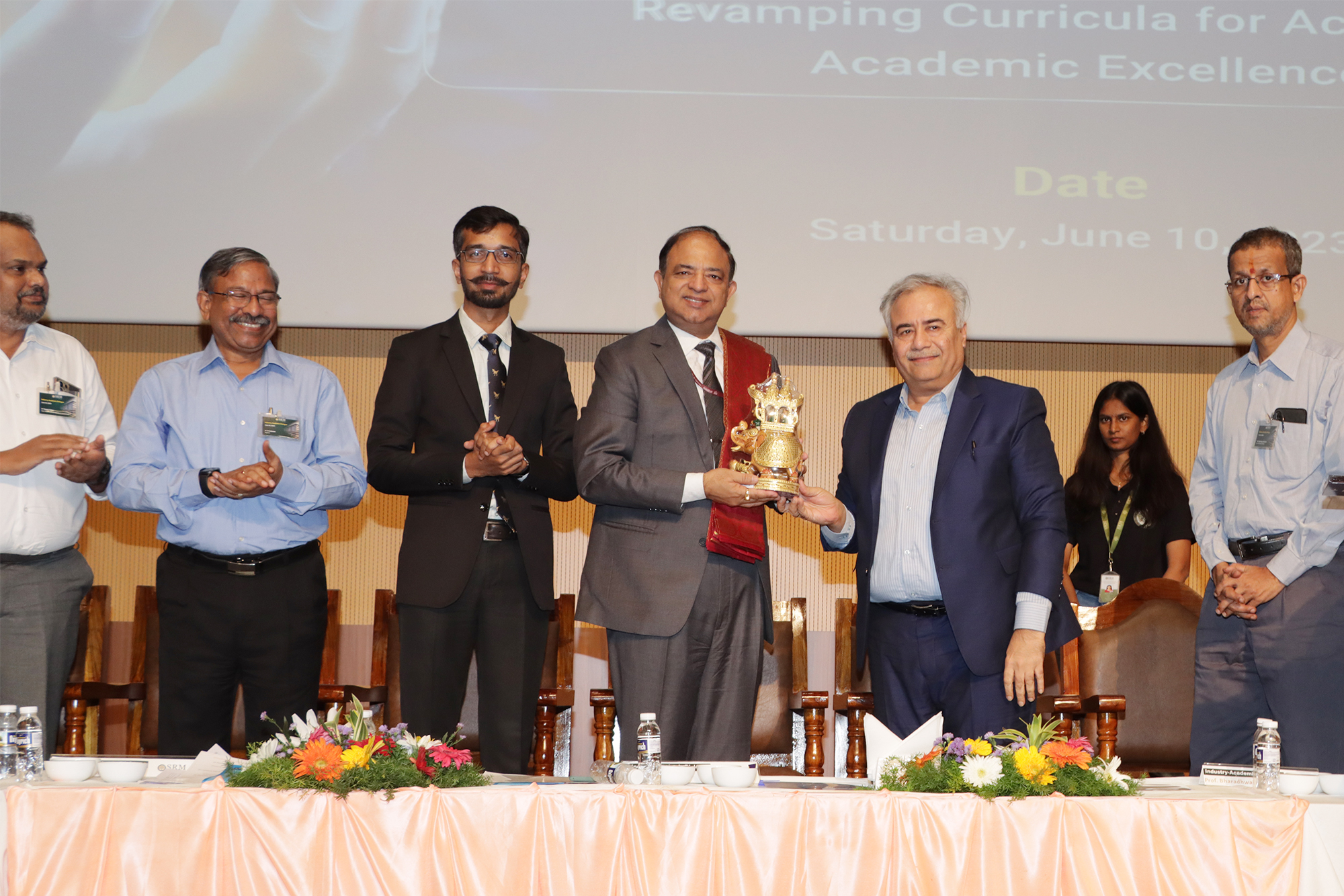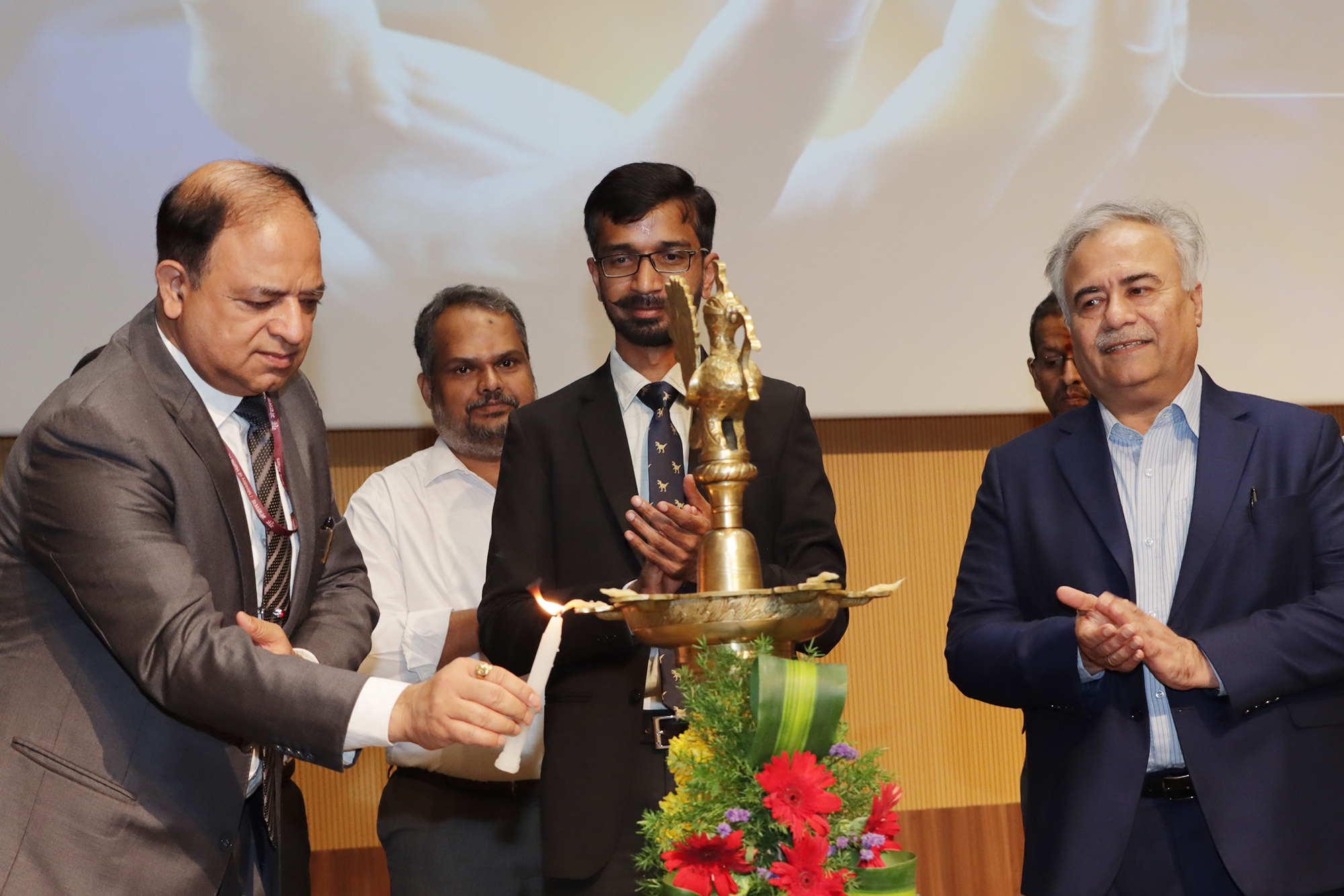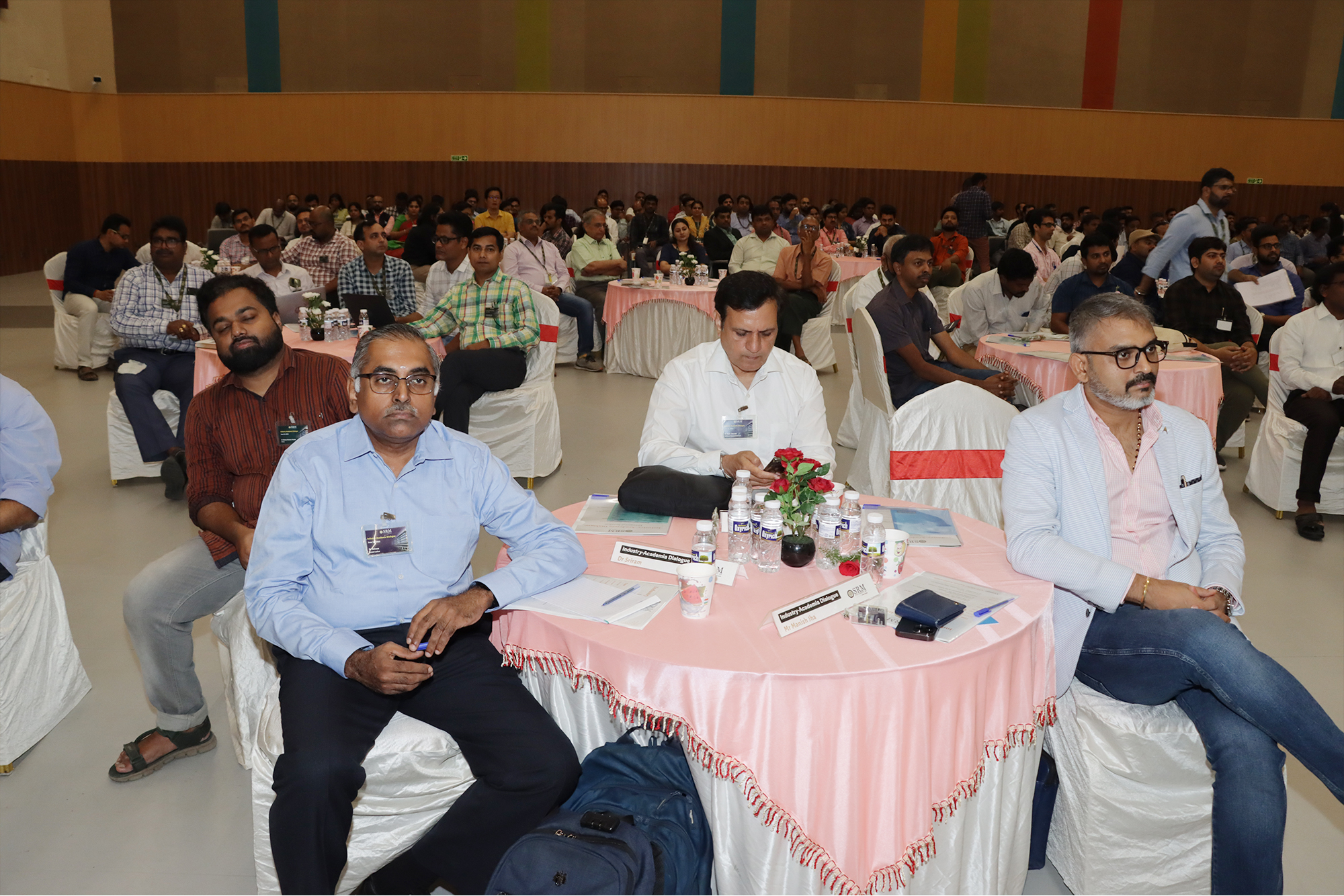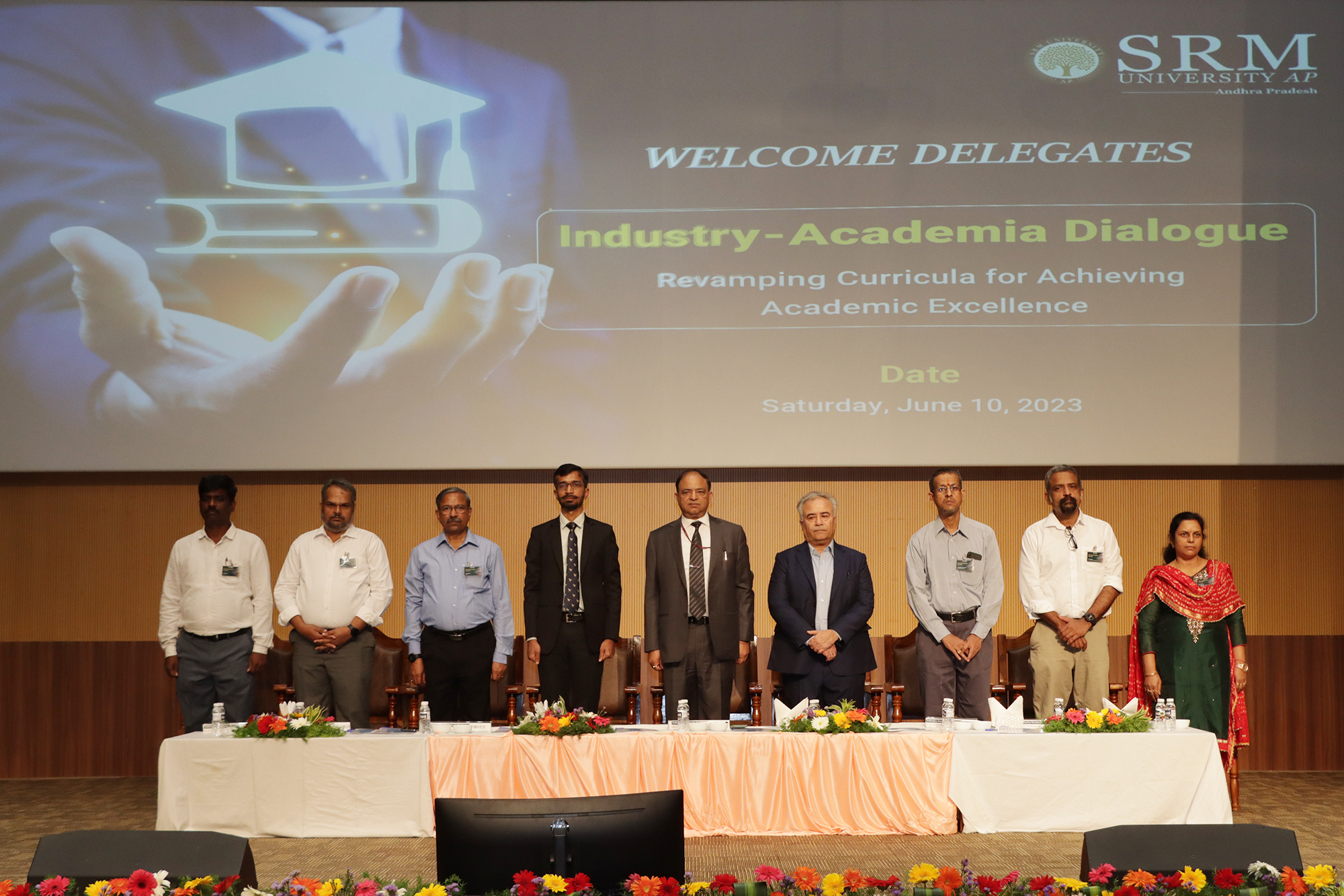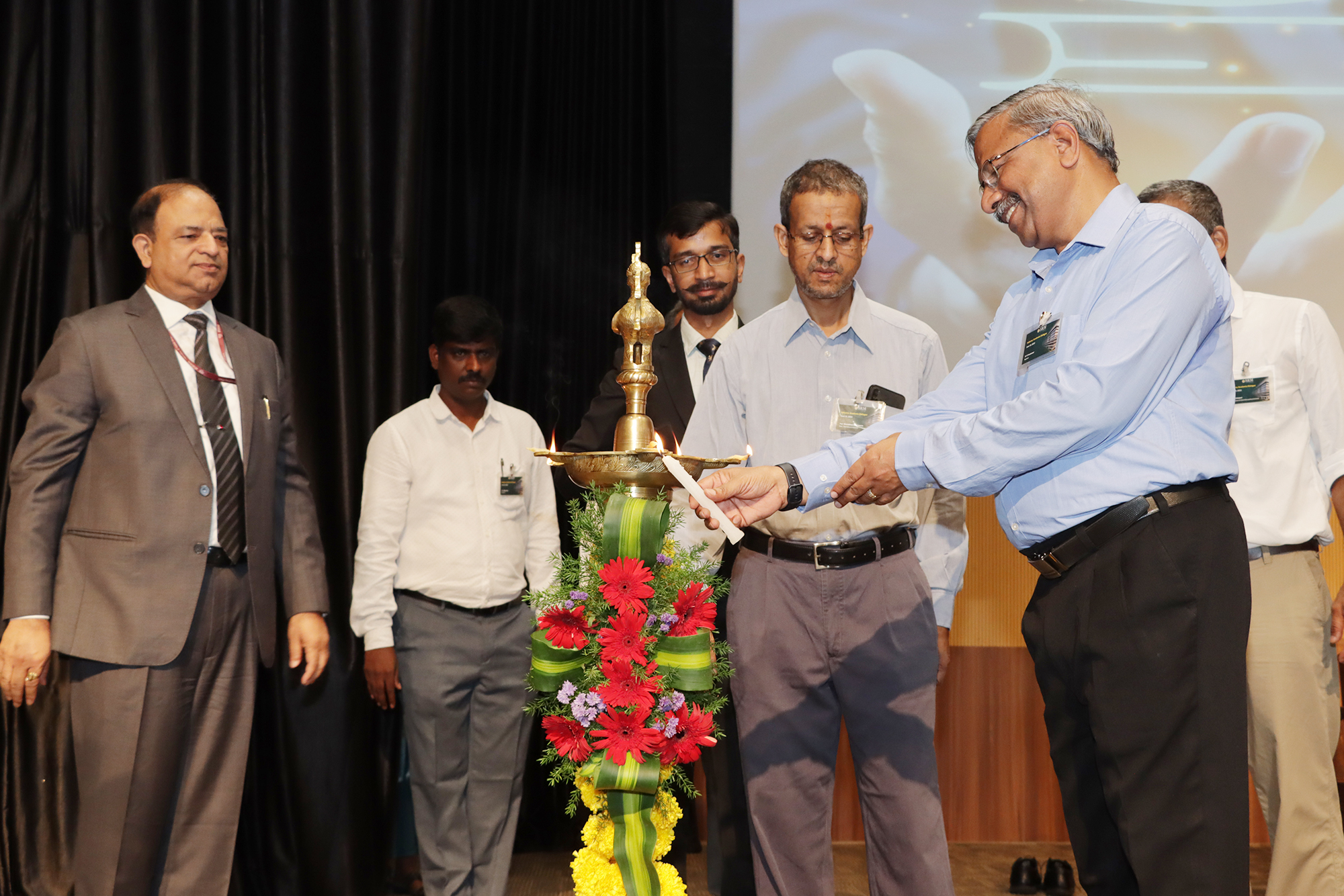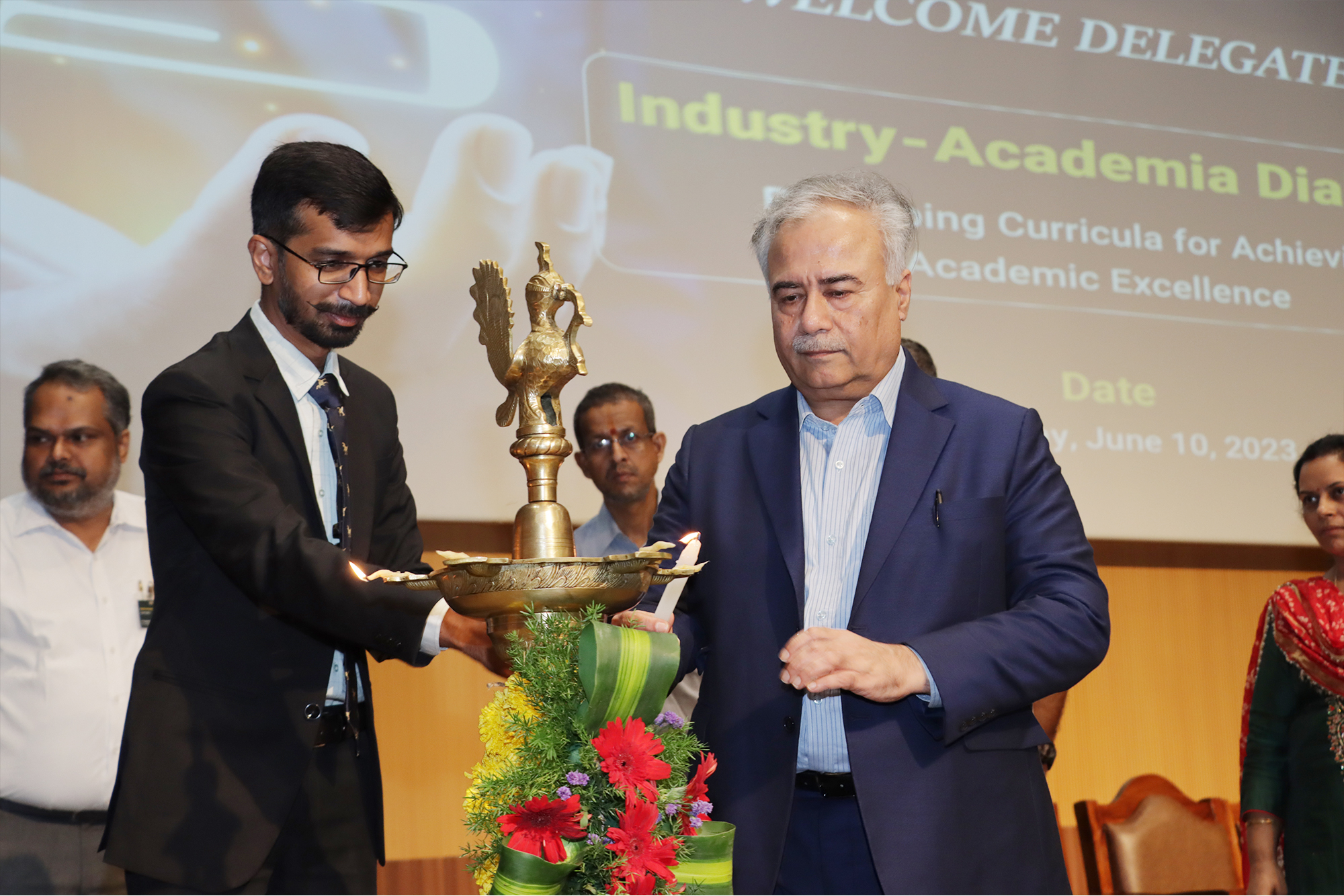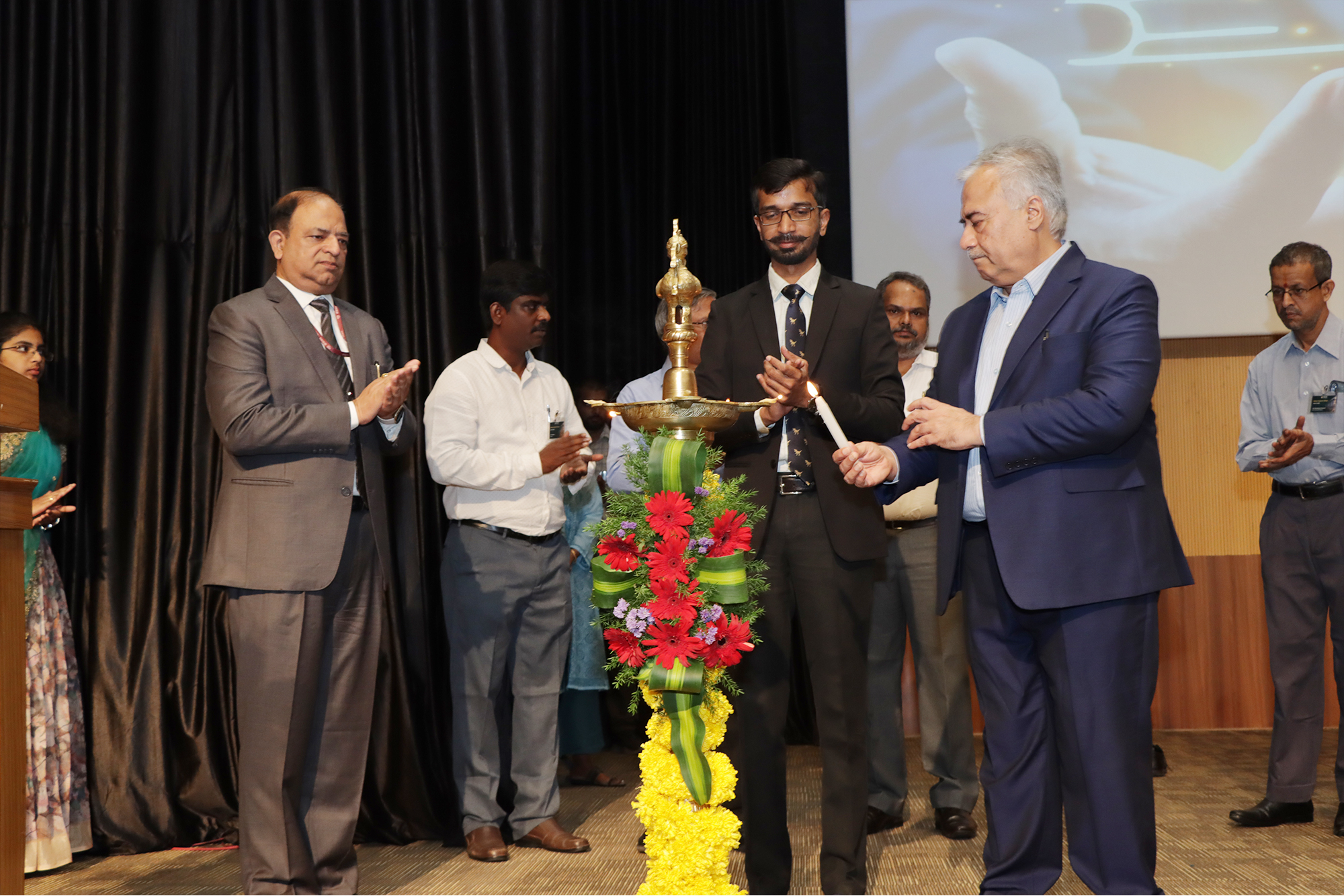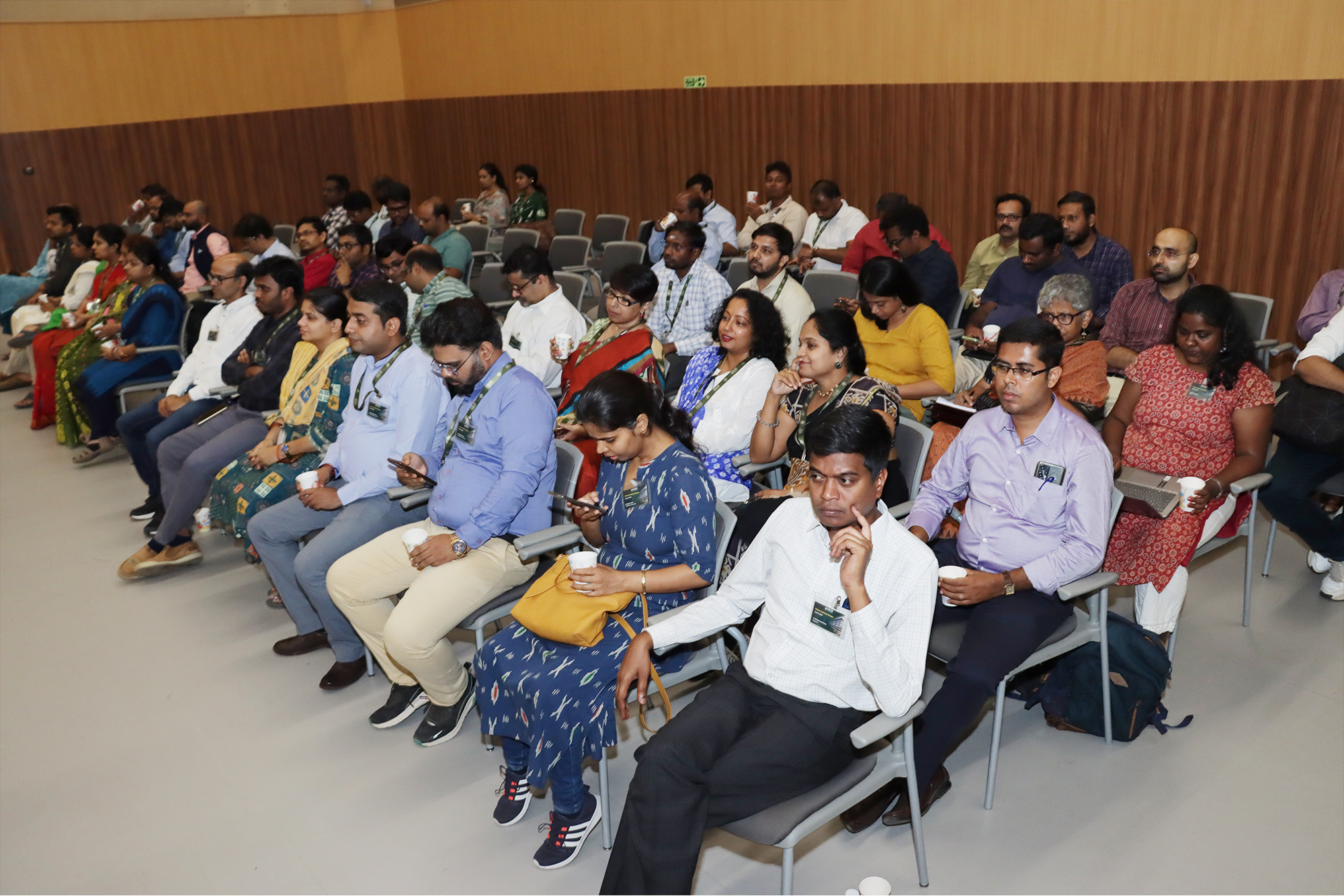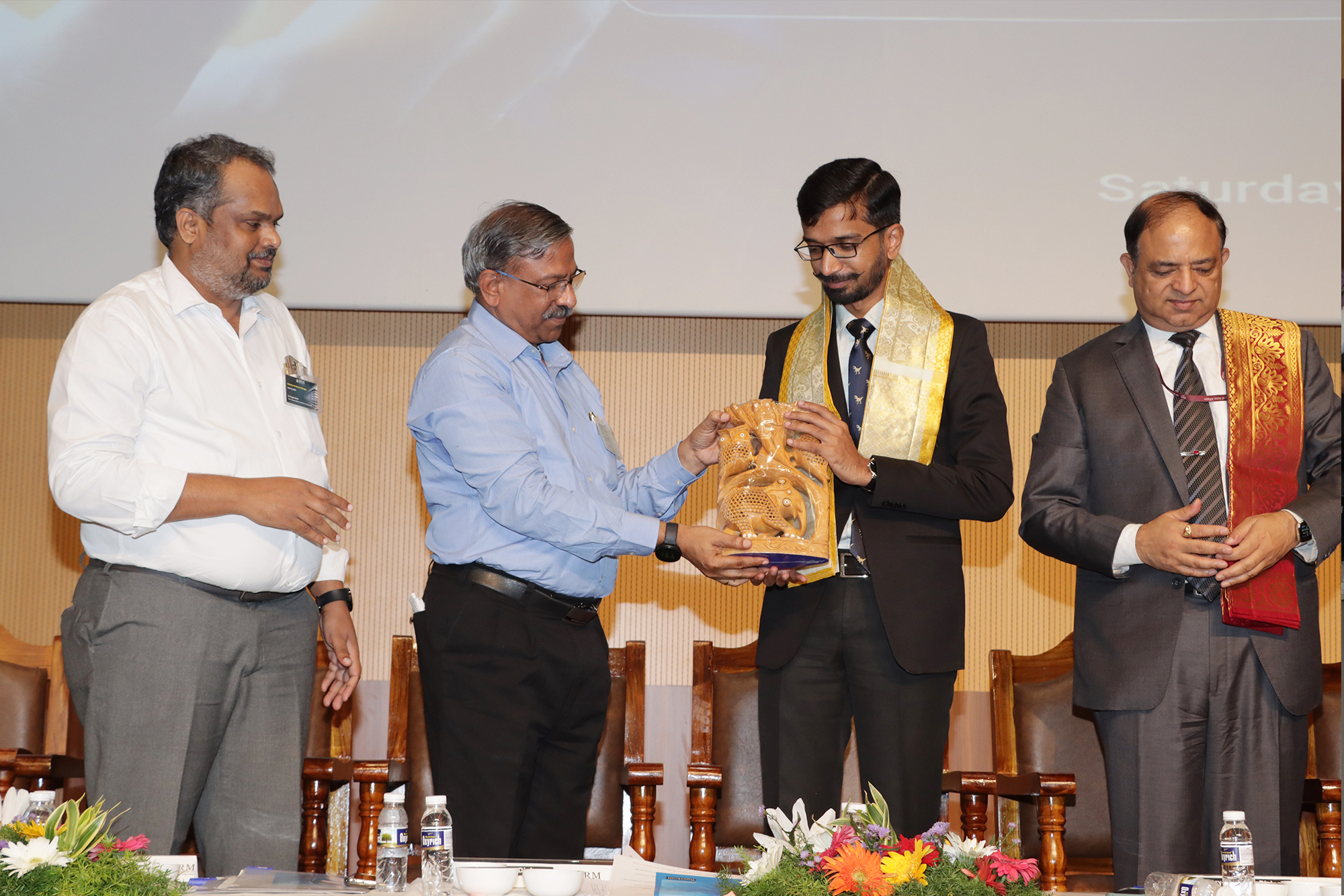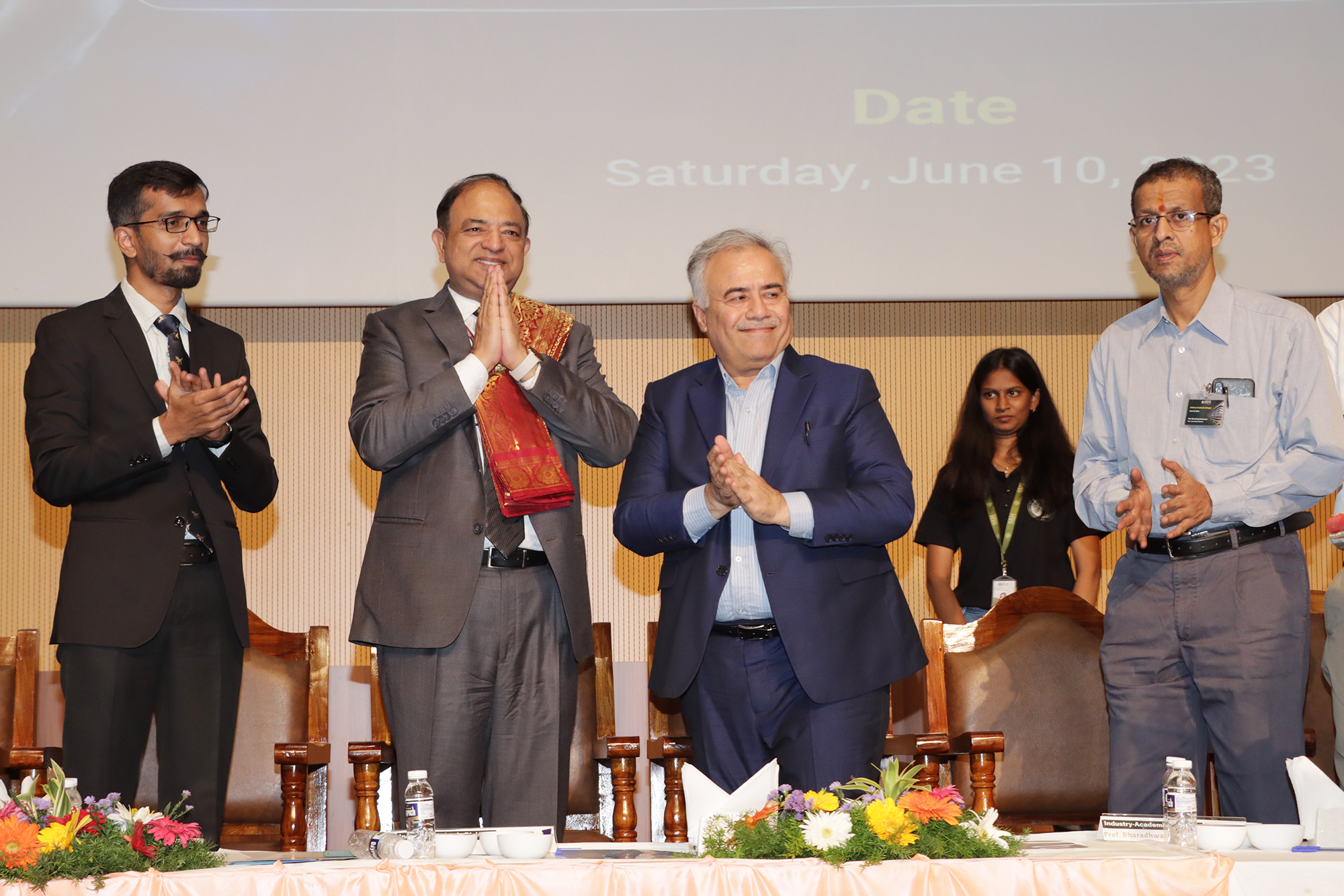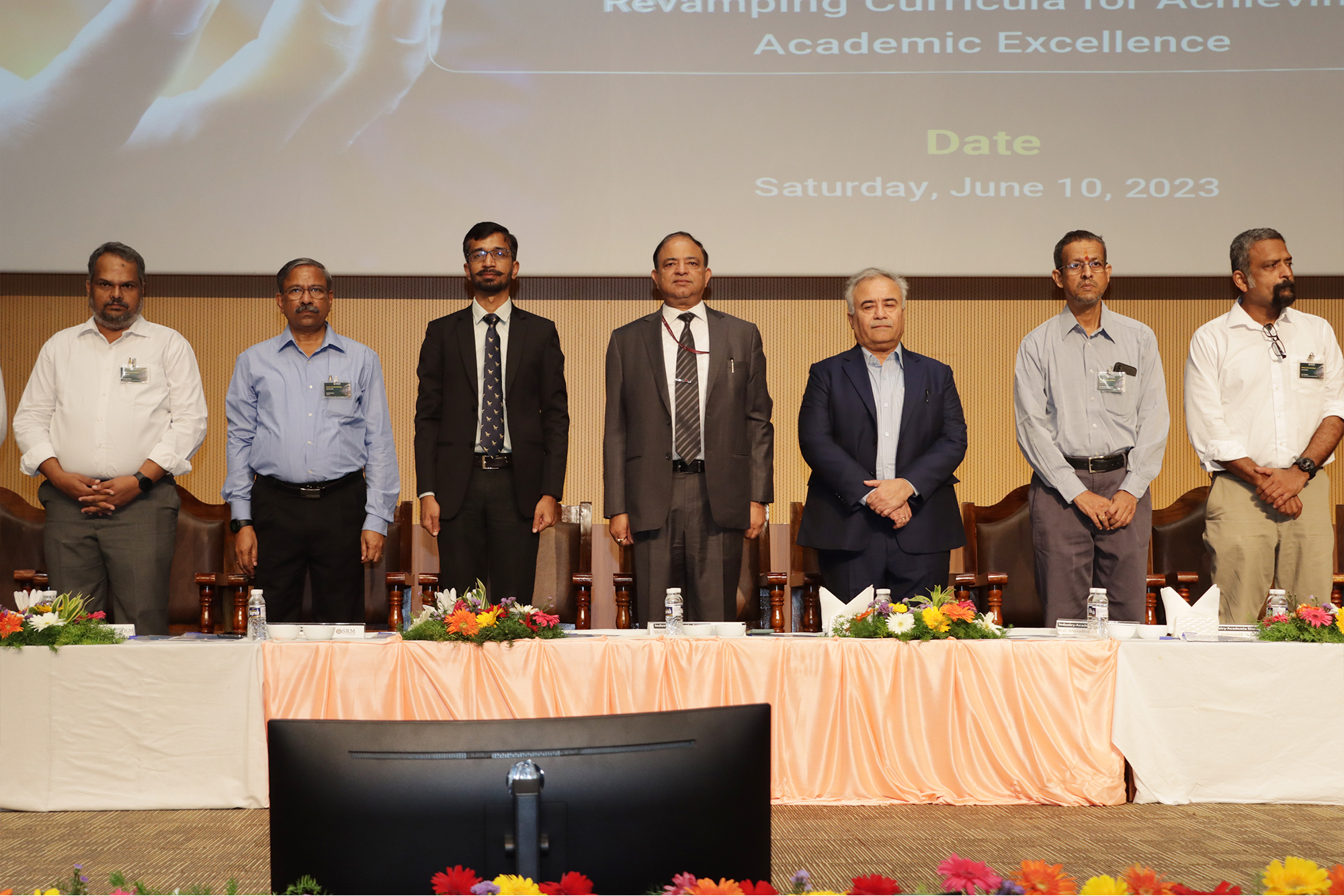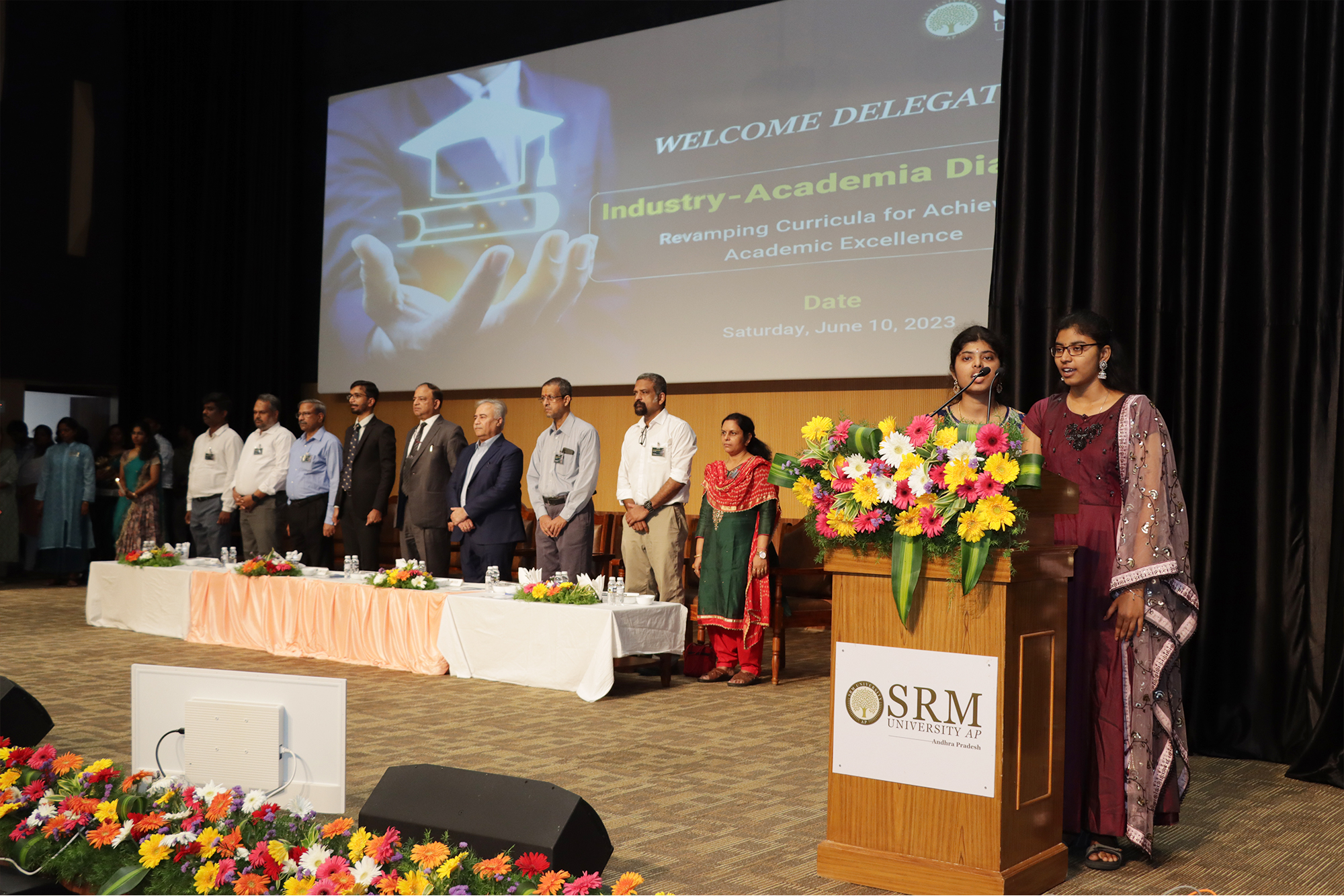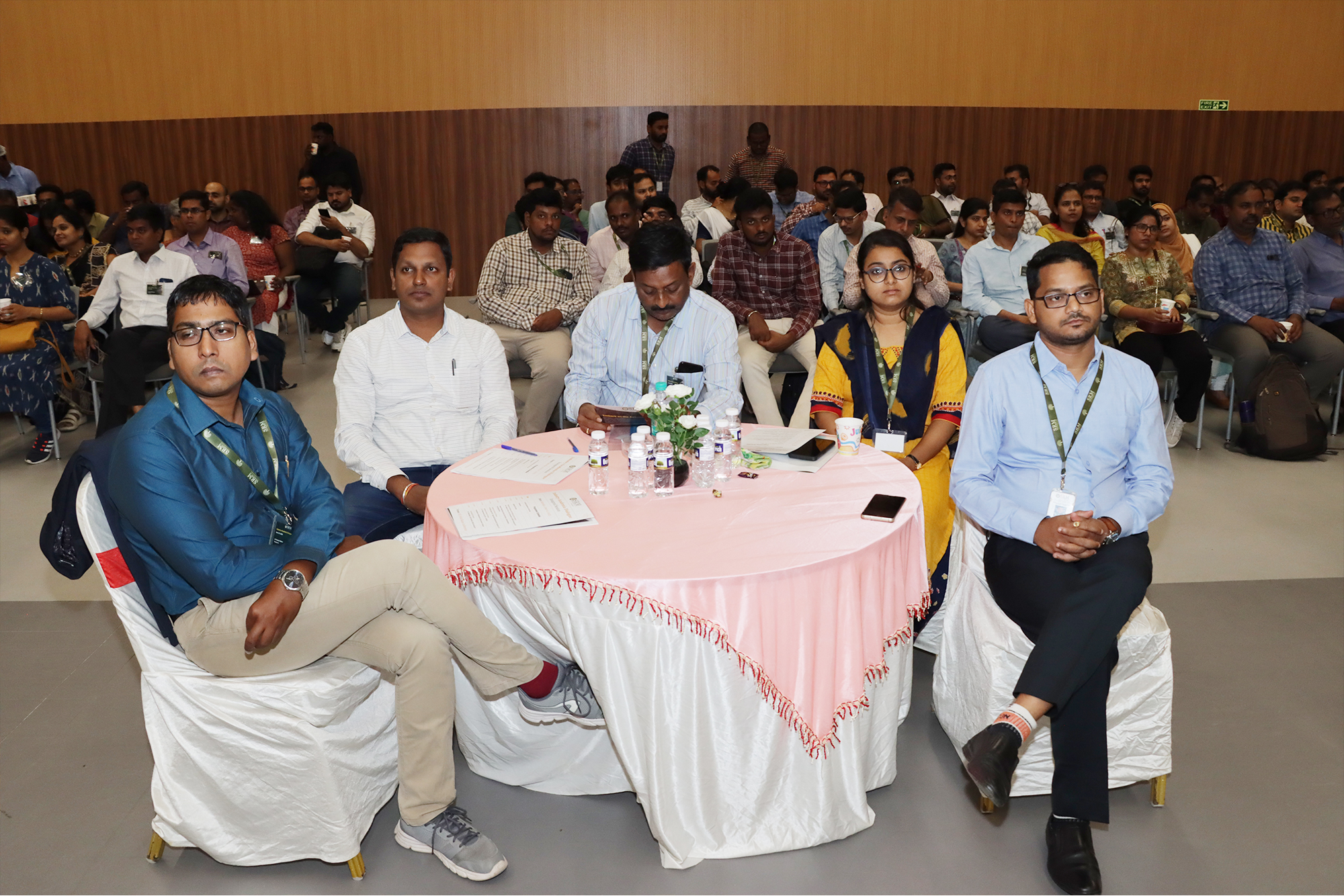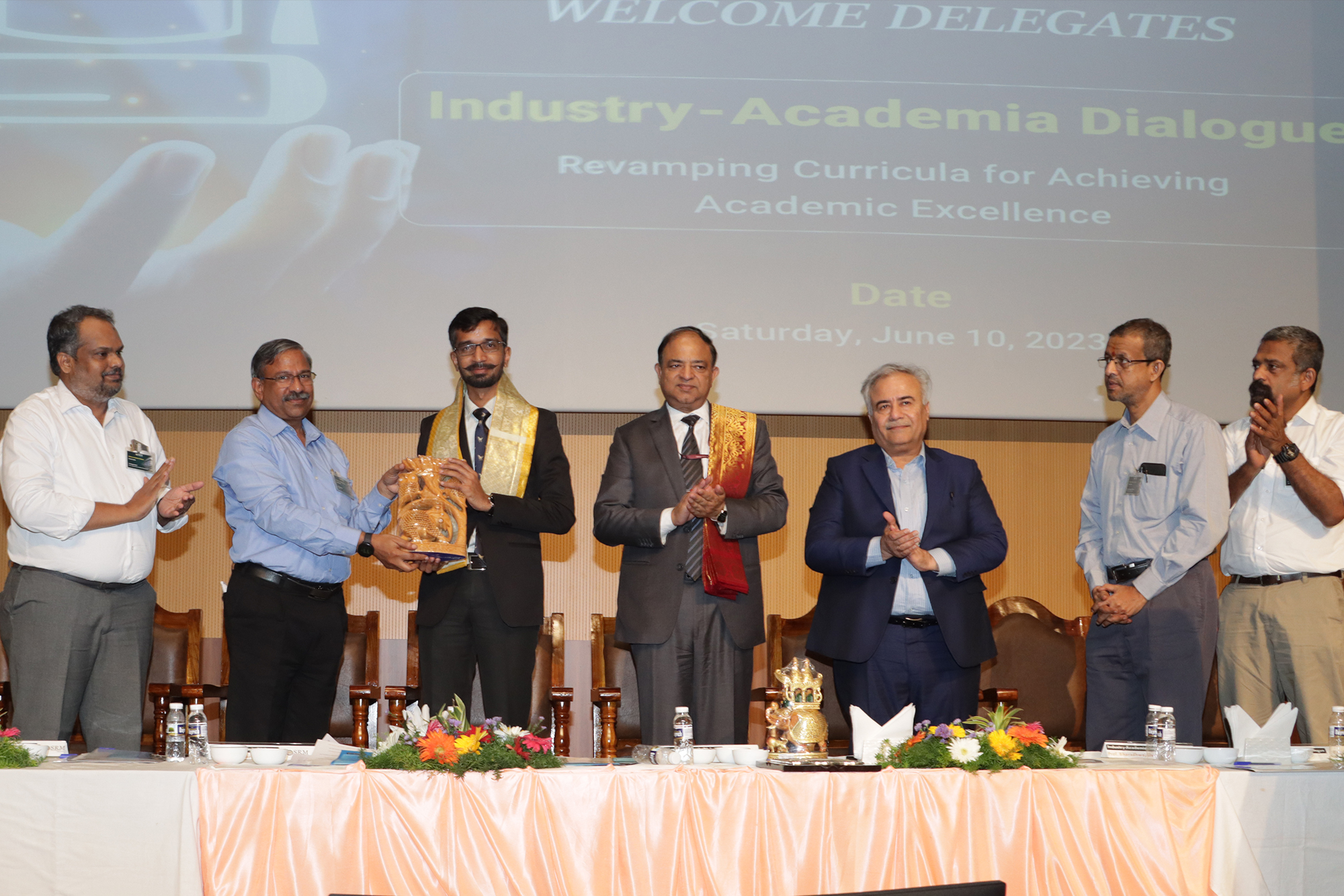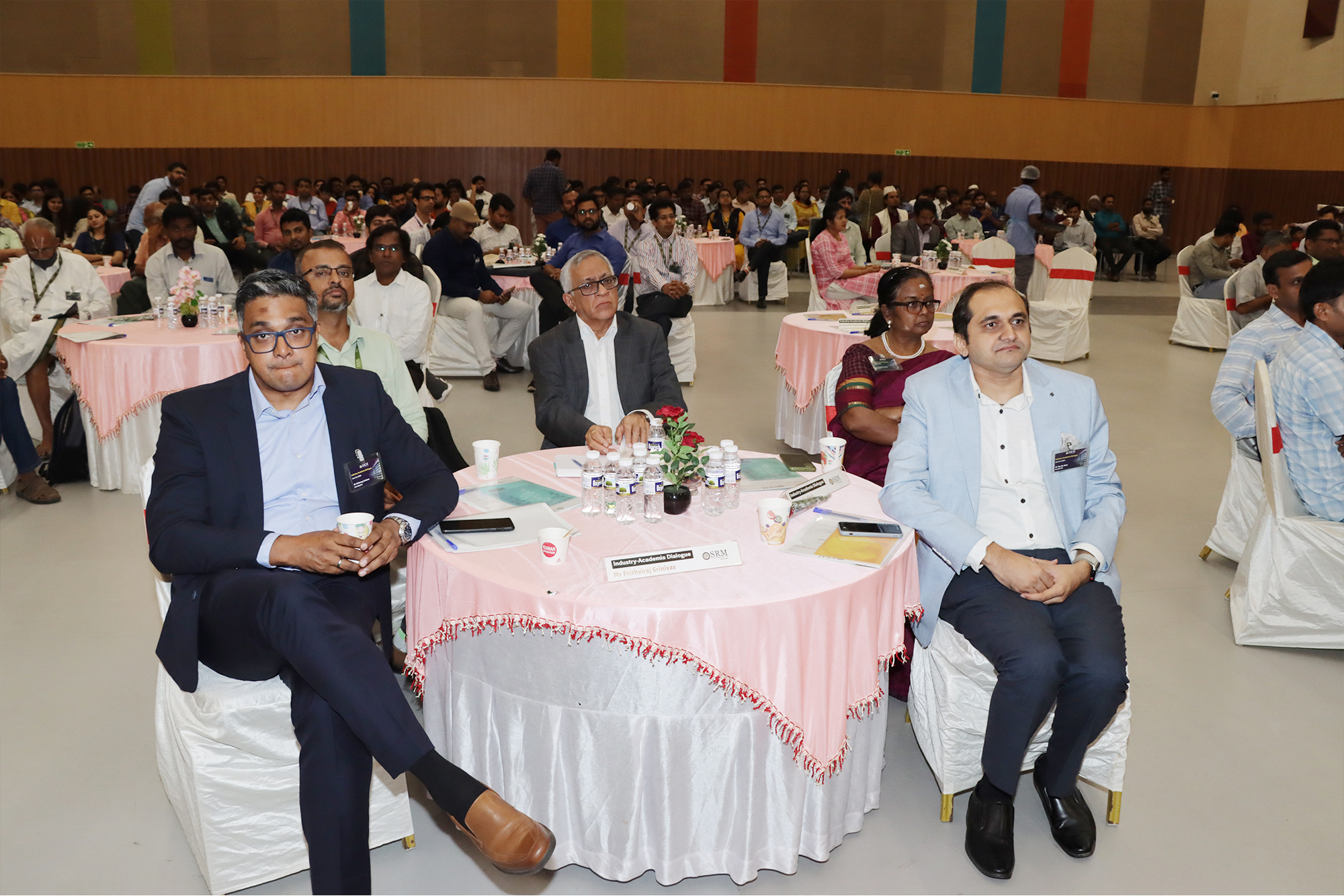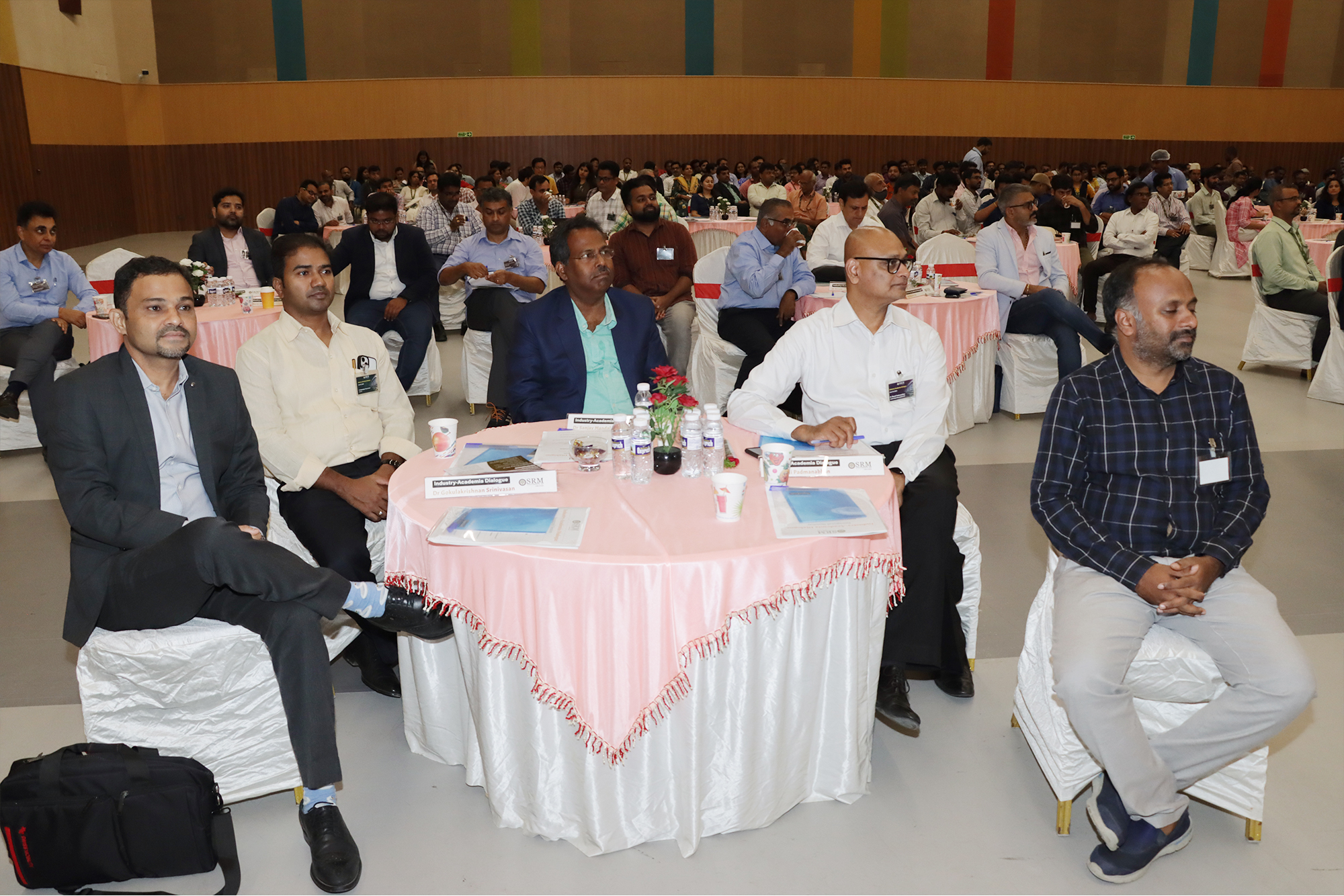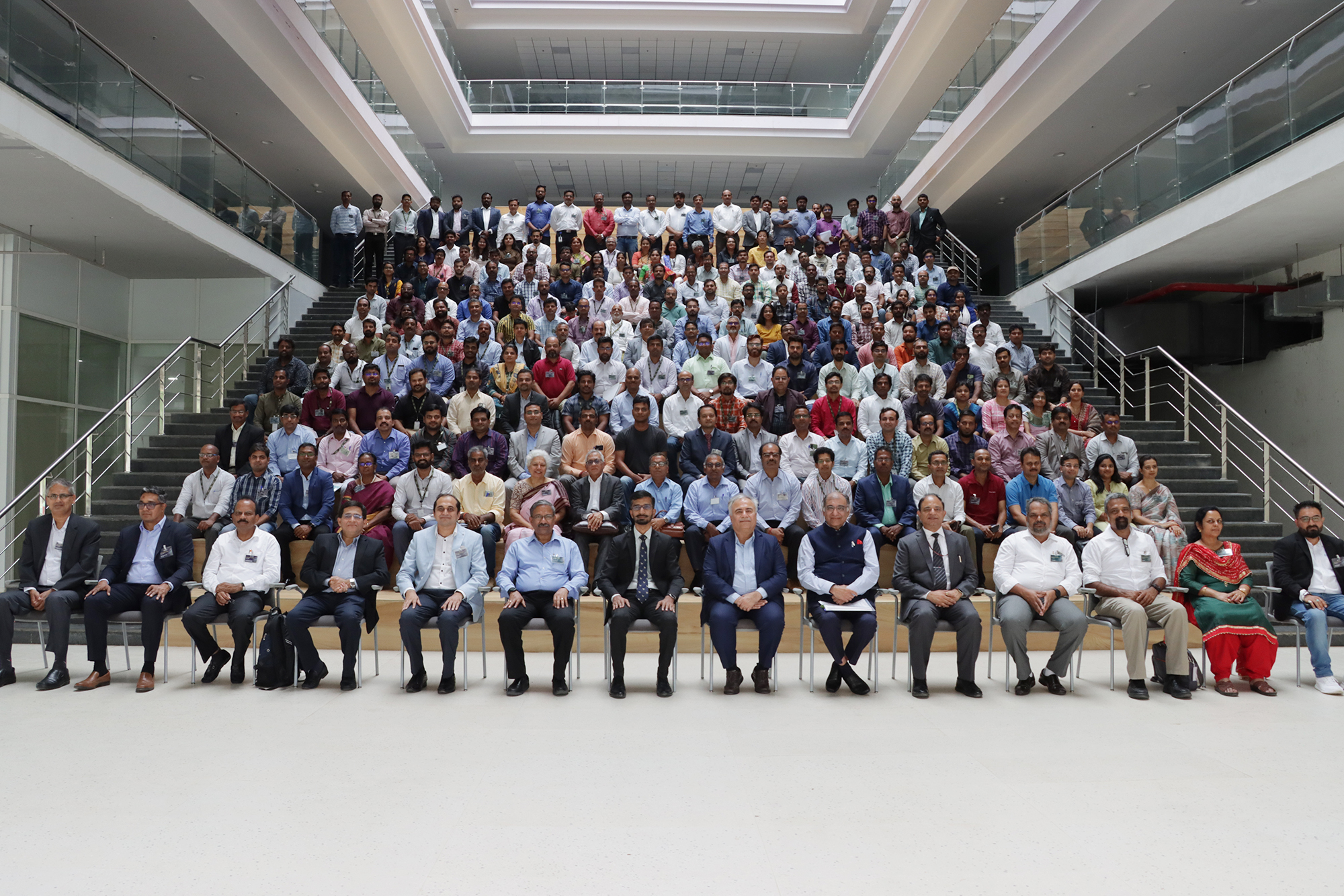1st Research Scholar’s Summit: A Symposium of Ideas and Innovation
“The very idea of a platform such as this is to promote multidisciplinary collaborative research,” emphasised Prof. K Hemachandra Reddy, Chairman, Andhra Pradesh State Council of Higher Education (APSCHE), encapsulating the spirit of the 1st Research Scholar’s Summit hosted at SRM University-AP in partnership with the Government of Andhra Pradesh. The event was staged to reinforce research within academic circles and herald a new phase of learning. The summit was attended by esteemed dignitaries like Prof. Korukonda Babji, Vice Chancellor Dr Y S R University of Health Sciences; Prof. Ramesh Srikonda, Director-School of Planning and Architecture; Dr M Balakrishnan, IIT, Delhi, along with Vice Chancellor, Prof. Manoj K Arora; Registrar, Dr R Premkumar, Deans, Faculty, and Students.
In his keynote address, Vice Chancellor Prof. Arora emphasised the pivotal role of such summits in fostering a conducive environment. He stated, “We live in a world of collaborations, and a summit like this gives an opportunity to interact, establish partnerships and forge scholarly excellence”. He highlighted the varsity’s research acumen in the form of patents, technology transfers, research publications, start-ups, and incubations. He also declared that the varsity would be open to sharing its state-of-the-art research infrastructure among the broader demography in order to foster a research mindset among all.
Prof. Ranjit Thapa, Dean-Research at the university, highlighted the participation of 150 PhD scholars from diverse institutions. His speech reflected the tireless commitment to building the university’s scientific fortitude. Prof. Srikonda underscored the significance of technological advancement and innovation. He praised the summit for being a stage that will offer pragmatic solutions to societal challenges and commended its tagline – “Inspire, Ignite, Innovate,” for aligning with its core objectives.
Prof. Korukonda Babji and Prof. M Balakrishnan, pivotal figures in academia, articulated the transformative role of cutting-edge research in elevating society. They emphasised the potential of such forums in catalysing groundbreaking changes in research.
The summit showcased presentations from doctoral scholars, encompassing 60 poster presentations and 90 oral presentations, organised across 8 thematic areas. The summit concluded with a valedictory function, and tokens of appreciation were presented to the dignitaries by the Vice Chancellor, Registrar, Deans, and convenors, Dr Ramanjaneya Reddy and Dr Sabyasachi Chakrabortty, and members of the organising committee.
- Published in News, Research Conferences, Research News
International Conference on Transformations in Engineering Education – Imparting the Futuristic Skills (ICTIEE AP’ 18)
International Conference on Transformations in Engineering Education – Imparting the Futuristic Skills (ICTIEE AP’ 18)
Date: 15 – 17 July 2018, SRM University – Andhra Pradesh
Program Schedule: Click Here
- Published in Conferences, Events, Research Conferences, Research Events
International Conference on Green energies and Technologies for smart cities
- Published in Conferences, Events, Research Conferences, Research Events
Asian Consortium on Computational Materials Science – International Conference on Material Genome (ACCMS-ICMG)
The Asian Consortium on Computational Materials Science (ACCMS) was set up in 2000 in order to nurture and promote research and development activities in computational materials in Asian countries. ACCMS entered into the 16th year of existence and the conduct of 10 successful conferences and 12 general meetings of this virtual organization have boosted the computational materials research in the Asian region. In order to optimally utilize our resources and manpower, it is widely felt that we should have a ‘real’ organization to steer young researchers towards computational research. It is envisaged that the conduct of International Conference on Material Genome at SRM University, AP-Amaravati, will lay the foundation for an active center of ACCMS on campus. For more details: https://srmap.edu.in/accms-2020/
- Published in Conferences
Third international conference at SRM University AP, Andhra Pradesh campus
Asian Consortium on Computational Material Sciences-International Conference on Material Genome (ACCMS-ICMG) and Fracmeet Conference
The campus welcomes international and national researchers along with members of ACCMS and Fracmeet organizations to take part in two parallel international conferences hosted by SRM University AP, Andhra Pradesh on 5th-7th February, 2020. The 3-day conference was inaugurated by the guests, Prof. Yoshiyuki Kawazoe, Tohoku University, Japan, Dr. Purusattam Ray, IMSc, Chennai, Dr. D. Gunasekaran, Registrar, Dr. B. Sivakumar, Deputy Registrar, and Prof. Durga Rao, Dean-SLABS. ACCMS-ICMG 2020 Convener, Prof. Ranjit Thapa, Department of Physics, and Fracmeet 2020 Convener, Dr. Soumyajyoti Biswas, Department of Physics, initiated the launch of the abstract book by the guests and dignitaries to begin the conference.
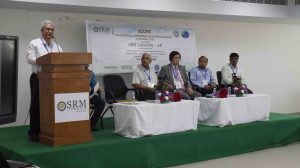 Dr. D. Gunasekaran, Registrar, addressing the audience on the inaugural event of ACCMS & Fracmeet conference.
Dr. D. Gunasekaran, Registrar, addressing the audience on the inaugural event of ACCMS & Fracmeet conference. Dr. Gunasekaran welcomed all the guests and addressed the audience. He introduced the university by recalling its infrastructural dominance, mentioning the eminent faculty, and discussing the collaborations with the University of California, Berkeley where students are sent for semester abroad programs. He also emphasized on the exposure offered to the students through international and national internships. “Our university encourages the young researchers through UROP where the students individually or in a group take up mini-projects under the guidance of our faculty. “Our faculty has published more than 120 journals in the last one year, along with 23 sponsored projects and 64 proposals that await funds from the agencies. SRM University AP, Andhra Pradesh is also collaborating with Indian Railways to build Hydrogen Trains, and Amara Raja Group on Energy Storage”, Dr. Gunasekaran pronounces. He also expresses his gratitude to the distinguished guests and assures to extend extensive support from the university’s end.
The Asian Consortium on Computational Materials Science (ACCMS) was set up in 2000 to promote research and development activities in computational materials in Asian countries. Prof. Yoshiyuki Kawazoe says “Computational materials was not a coined term in Japan when we started off this organization 20 years back. We merely had 7-8 participating nations who met on virtual platforms regularly or at conferences once in a while. In order to optimally utilize our resources and manpower, it is widely felt that we should have a ‘real’ organization to steer young researchers towards computational research. It is envisaged that the conduct of the International Conference on Material Genome at SRM University AP, Andhra Pradesh will lay the foundation for an active center of ACCMS on campus.”
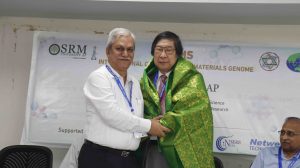 Prof. Yoshiyuki Kawazoe and Registrar at the opening of the conference.
Prof. Yoshiyuki Kawazoe and Registrar at the opening of the conference. 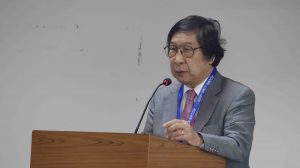 Prof. Yoshiyuki Kawazoe addressing the audience.
Prof. Yoshiyuki Kawazoe addressing the audience. He further addresses that the purpose of ACCMS is to solve large probabilistic problems through Quantum Mechanics based calculations followed by Machine Learning (QM/ML). “We are aiming at developing language and characters prior to the western nations and secure a superior position for Asian countries”. Few themes to be covered in this chapter of ACCMS conference includes “Machine Learning for materials”, “High-throughput Computation”, “Polar Magnetic Materials”, “Thermoelectric Materials”, etc.
Fracmeet conferences are being organized for over a decade to focus on an aspect of Material Science – “Mechanical Properties of Complex Materials.” The multidisciplinary collaborative meetings of this organization welcome scholars from Chemistry, Physics, and Engineering domains, along with people from the industry. Prior to this, the annual conferences and meetings of Fracmeet were held at IMSc., Chennai, where Fracmeet was initiated. For the first time, SRM University AP, Andhra Pradesh, having exceptional infrastructure and facilities, is hosting this conference in collaboration with IMSc. This year, Fracmeet is aiming at discussing “Micromechanics of failure in disordered material” in this conference.
 Dr. D. Gunasekaran, Registrar, Dr. B. Sivakumar, Deputy Registrar with the convener, Dr. Purusattam Ray.
Dr. D. Gunasekaran, Registrar, Dr. B. Sivakumar, Deputy Registrar with the convener, Dr. Purusattam Ray. The conferences will be held in parallel sessions for 3 days, from 5th to 7th February 2020, where delegates will be presenting their papers and discussing important issues to develop unique solutions for addressing challenges.
For more details, please visit: https://srmap.edu.in/accms-2020/
- Published in Conferences, Physics
Industry Academia Summit 2020
Interactive session with industrial inventors
Inauguration of the first Industry Academia Summit at SRM University AP, Andhra Pradesh was graced by the presence of eminent personalities- Smt. R.K. Roja, MLA, and Chairperson of APIIC, Sri Vijay Naidu Galla, Chairman-CII Andhra Pradesh, and Sri S Vijay Anand, CEO, Amara Raja Batteries Ltd. representing the Government, Industry, and Academia along with Prof. D Narayana Rao, Pro VC, Dr. D Gunasekaran, Registrar, Dr. GS Vinod Kumar, Convener. This summit is organized in association with Confederation of Indian Industry (CII) which provides a platform to bridge the gap between industrial needs and academic research.
The inaugural ceremony began with lamp lighting by distinguished guests. Dr. Narayana Rao welcomed the guests and introduced SRM University, AP as a multidisciplinary research intensive institute. He says, “The students have international exposure and experience through internships, semester abroad programs in partnership with MIT and UC Berkeley. Our university worked on projects such as hardening of gold alloy and 3D printing on gold jewellery in association with Tanishq. Also, SRM Amara Raja Centre of Excellence will be established in SRM AP for developing energy storage devices. SRM AP is also working at the flagship project of developing hydrogen infused railway engines in partnership with the Indian Railways.”
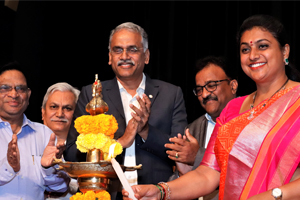 Inaugural Lamp Lighting by Smt. Roja
Inaugural Lamp Lighting by Smt. Roja
Prof. Narayana Rao also emphasizes on the necessity of this summit. He explains the significance of translating research for the improvement of the society’s lifestyle. He says, “Due to the advent of corona virus in China, the price of paracetamol tablets in India has increased 40% in the last three weeks. This is contributed by our pharmaceutical industry’s substantially dependency on the ingredients imported from China. Therefore, the government requires to initiate efforts to promote and nurture an environment for researchers where they can deliver cost effective solutions to such challenges.” He further says, “It is necessary that the corporates should start relying on and reaching out to the academicians and researchers in India, and not foreign nations. The timeframe of the research should be agreed upon to achieve the desired goals. It is also important for the industrialists to be aware of the expertise of the Indian researchers. There is a need of paradigm shift from foreign reliance to self-reliance. The collaborative model among industry and academia must evolve keeping pace with the dynamism of industry.” Professor Rao also coined the term Corporate Professor and requested the professionals from industries to teach the students and prepare them for the future. He also suggested that the academicians should work in the corporate houses to understand their requirements.
CII was founded in 1985 to encourage collaboration among industrialists who can march forward to self-sufficiency through exchange of knowledge and skills. “CII works as a catalyst to promote entrepreneurial talent pool emerging from the universities”, says Sri Vijay Naidu Galla. He further discusses the gap between knowledge creation and utilization, and also offers solutions to bridge the gap. “Post liberalization in 1991, more private universities have emerged as important players in education and significant women students are excelling at academics. India is targeting at $5trillion economy for which we require a 9-10% growth in GDP. He suggests that the government should facilitate the growth of institutions which can provide quality education by monitoring their performances and offering incentives in the form of specific assistance to the good performers. The industries should incur expenditure on supporting academic institutes that indulges in research work. Innovative ideas should be used to transform the traditional curriculum and align it to the industrial needs. The institutes should create a lifelong learning environment, imbibe values and ability to work as a team, and be able to empathize with the society and understand its needs.
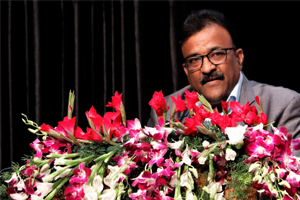 Sri Vijay Naidu Galla speaks on understanding the societal needs
Sri Vijay Naidu Galla speaks on understanding the societal needs
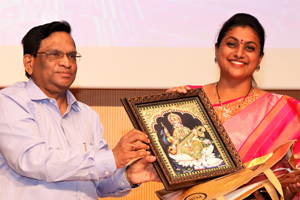 Presentation of the Memento to Smt. Roja by Prof. Rao
Presentation of the Memento to Smt. Roja by Prof. Rao
Smt. R. K. Roja shared the initiatives taken by the Government of Andhra Pradesh to inspire the youth to indulge in research. She also discussed the vision of the Govt. of Andhra Pradesh in the next five years in this domain. She has also appreciated SRM-AP’s infrastructure and research initiatives. She believes, “The collaborative research between the industry and universities like SRM-AP will help the youth to do revolutionary work in nation’s progress”. Smt. R. K. Roja shared the initiatives taken by the Government of Andhra Pradesh to inspire the youth to indulge in research. She also discussed the vision of the Govt. of AP in the next five years in this domain. She has also appreciated SRM-AP’s infrastructure and research initiatives. She believes, “The collaborative research between the industry and universities like SRM-AP will help the youth to do revolutionary work in nation’s progress”. She further says, “Our youths already have the qualities that are needed for pathbreaking research. However, the necessary skill-sets that are required in Corporate environment is still missing. The government of AP has already implemented some policies to overcome this. Also, to help and support the industry in every way possible, Government of Andhra Pradesh’s Industry Policy is in place. Single Desk Policy has been introduced to make processes easier for the industry personnel.”
Sri Vijay Anand spoke of harnessing the potential of imaginative students. He says, “In India, infrastructure is not a bottleneck, it is already churning out half a million tech graduates a year. We are abundantly endowed with human capital.” He spoke of a Japanese term called “ikigai”, which identifies with a man who loves what he does, in which he is good at, and what he does provides solutions to society’s problems. He also spoke of emerging trends in the technological sphere such as AI, ML, Bioelectronics, and genome research. “Industry and academics, facilitated by the government needs to exploit the technology and find a common purpose so as to align to each other’s working methodologies”.
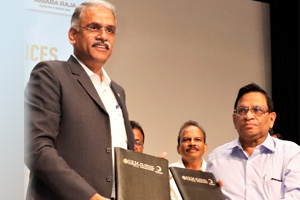 MOU Signing Between Amara Raja Batteries Ltd and SRM University-AP, Andhra Pradesh
MOU Signing Between Amara Raja Batteries Ltd and SRM University-AP, Andhra Pradesh
In order to uphold the spirit of collaboration between industry and academics, Amara Raja Batteries Ltd. and SRM AP signed MOU to develop Amara Raja Centre for Energy Storage Devices at SRM AP campus.
Picture credit (photography society)
Hemanth.P
AP1811001092
CSE-C.
Thota Mohan Sai Krishna
AP1811001029
CSE-A.
JAYANTH SATYANARAYANA.T
AP18110020072
ECE-B.
PINNINTI SAI SUKUMAR
Ap18110010545
CSE-09I.
- Published in Conferences
International Conclave on the Role of Technology for the Sustainable Agricultural Growth for Future Generations
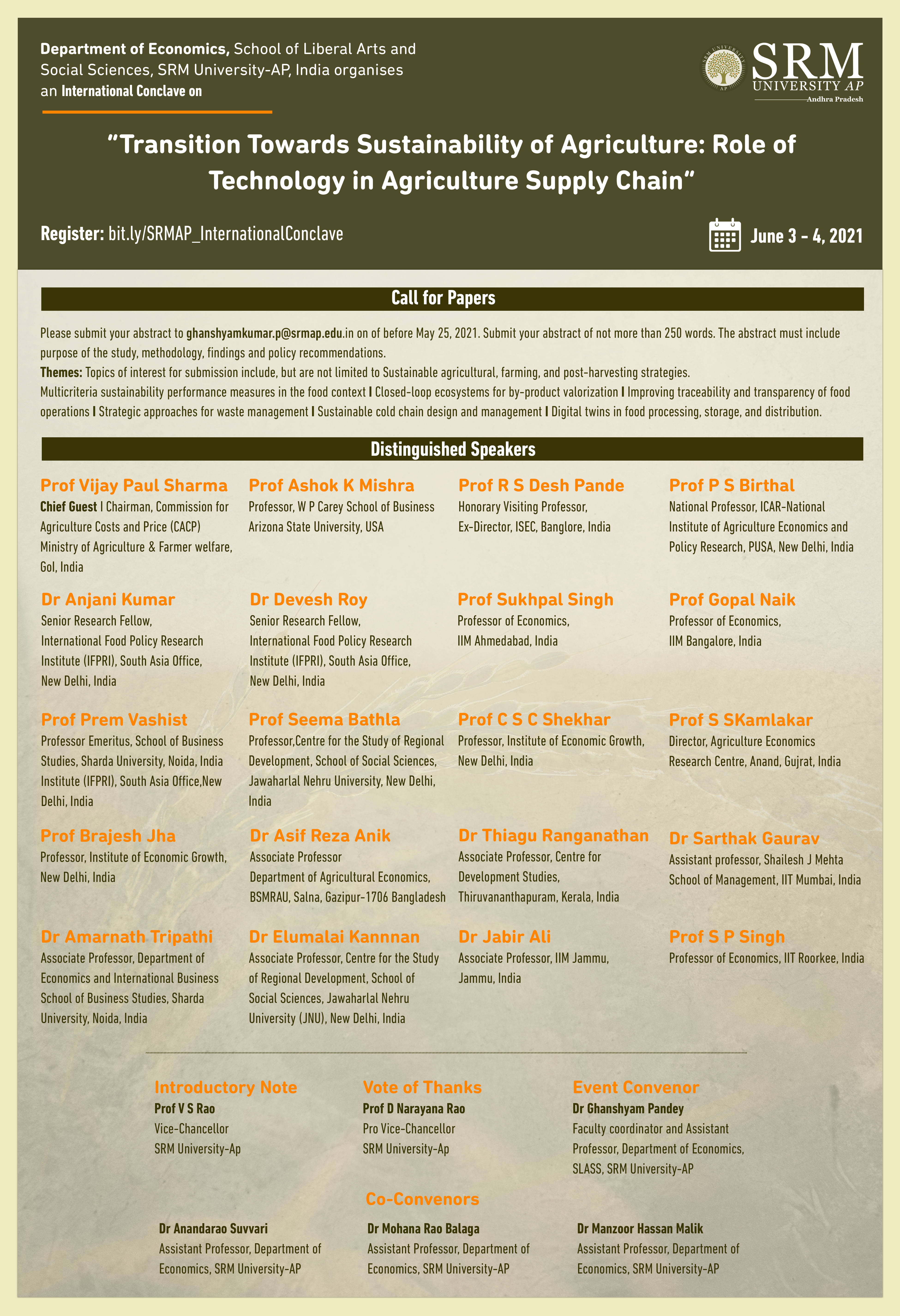 An International Conclave on the “Transition towards sustainability of Agriculture: Role of Technology in Agriculture Supply Chain” is being organised by the Department of Economics, School of Liberal Arts and Social Sciences, SRM University-AP, Andhra Pradesh on June 3-4 from 9 am. Renowned economists and experts across the world will be joining the conclave to share their thoughts and perspectives on the much-needed topic of this time. Faculty and Scholars are invited to submit the abstracts of their research papers on or before May 25, 2021. Prof Vijay Paul Sharma, Chairman, Commission for Agriculture Costs and Price (CACP) Ministry of Agriculture & Farmer Welfare, Govt of India, will grace the conclave with his presence as the Chief Guest.
An International Conclave on the “Transition towards sustainability of Agriculture: Role of Technology in Agriculture Supply Chain” is being organised by the Department of Economics, School of Liberal Arts and Social Sciences, SRM University-AP, Andhra Pradesh on June 3-4 from 9 am. Renowned economists and experts across the world will be joining the conclave to share their thoughts and perspectives on the much-needed topic of this time. Faculty and Scholars are invited to submit the abstracts of their research papers on or before May 25, 2021. Prof Vijay Paul Sharma, Chairman, Commission for Agriculture Costs and Price (CACP) Ministry of Agriculture & Farmer Welfare, Govt of India, will grace the conclave with his presence as the Chief Guest.
The agriculture and food sectors are facing multiple challenges. With the global population projected to grow from 7.6 billion in 2018 (UN DESA, 2019) to over 9.6 billion in 2050, there will be a significant increase in the demand for food (UN DESA, 2017). At the same time, the availability of natural resources such as fresh water and productive arable land is becoming increasingly constrained. Production is not the only concern; although agricultural output is currently enough to feed the world, 821 million people still suffer from hunger (FAO, 2018). Processes such as the rapid rate of urbanisation also have important implications for food production patterns and consumption. The agri-food sector remains critical for livelihoods and employment. There are more than 570 million smallholder farms worldwide (Lowder et al., 2016), and agriculture and food productions account for 28% of the entire global workforce (ILOSTAT, 2019).
Achieving the UN Sustainable Development Goal of a ‘world with zero hunger’ by 2030 will require more productive, efficient, sustainable, inclusive, transparent and resilient food systems. This will require an urgent transformation of the current agri-food system. Digital innovations and technologies may be part of the solution. The so-called ‘Fourth Industrial Revolution’ (Industry 4.0) observes several sectors to be transformed rapidly by ‘disruptive’ digital technologies such as Blockchain, Internet of Things, Artificial Intelligence and Immersed Reality. In the agriculture and food sectors, the spread of mobile technologies, remote-sensing services and distributed computing are already improving smallholders’ access to information, inputs, market, finance and training. Digital technologies are creating new opportunities to integrate smallholders into a digitally-driven agri-food system. In this two-day Internation Conclave, reputed experts will shed some light by sharing their wisdom with others on the recent challenges and the scope associated with it. Needless to say, food will always be an integral part of the basic need of humans. In these discussions, the path towards ensuring enough food supply for future generations will be searched.
The Department of Economics, under the School of Liberal Arts and Social Sciences at SRM University-AP, is a vibrant unit for teaching fundamental courses (core & electives) in Economics along with allied courses for students across the disciplines. In addition to the Foundation Courses and optional Minors across the departments, the department ensures that the education imparted is truly multidisciplinary with an excellent programme structure that can cater to the growing market demand for professional economists and policy researchers. At Present, the department offers B.Sc. (Hons.) and PhD in Economics and will soon offer a postgraduate programme with specialisations in Econometrics, Finance, Trade and Development in coming years.
Call for Papers:
Faculty and Scholars are invited to submit the abstracts to be presented at the conclave “Transition towards sustainability of Agriculture: Role of Technology in Agriculture Supply Chain” on or before May 25, 2021. The abstract must go through the review, and if accepted by the reviewers, the abstract acceptance notification will be sent. There is no registration fee to participate in the conclave. The event will take place entirely in virtual mode. Please submit the abstracts to ghanshyamkumar.p@srmap.edu.in on or before May 25, 2021. Abstracts should not be more than 250 words, and it must include the purpose of the study, methodology, findings and policy recommendations.
Themes:
Topics of interest for submission include, but are not limited to:
- Sustainable agricultural, farming, and post-harvesting strategies
- Multicriteria sustainability performance measures in the food context
- Closed-loop ecosystems for by-product valorisation
- Improving traceability and transparency of food operations
- Strategic approaches for waste management
- Sustainable cold chain design and management
- Digital twins in food processing, storage, and distribution
Distinguished Speakers:
- Prof Vijay Paul Sharma, Chairman, Commission for Agriculture Costs and Price (CACP)Ministry of Agriculture & Farmer Welfare, Govt of India
- Prof Ashok K Mishra, Professor, W P Carey School of Business, Arizona State University, USA
- Prof R S Deshpande, Honorary Visiting Professor, Ex-Director, ISEC, Bangalore, India
- Prof P S Birthal, National Professor, ICAR-National Institute of Agriculture Economics and Policy Research, PUSA, New Delhi, India
- Dr Anjani Kumar, Senior Research Fellow, International Food Policy Research Institute (IFPRI), South Asia Office, New Delhi, India
- Dr Devesh Roy, Senior Research Fellow, International Food Policy Research Institute (IFPRI), South Asia Office, New Delhi, India
- Prof Sukhpal Singh, Professor of Economics, IIM Ahmedabad, India
- Prof Gopal Naik, Professor of Economics, IIM Bangalore, India
- Prof Prem Vashisth, Professor Emeritus, School of Business Studies, Sharda University, Noida, India
- Prof Seema Bathla, Professor, Centre for the Study of Regional Development, School of Social Sciences, Jawaharlal Nehru University, New Delhi, India
- Prof C S C Shekhar, Professor, Institute of Economic Growth, New Delhi, India
- Prof S S Kamlakar, Director, Agriculture Economics Research Centre, Anand, Gujrat, India
- Prof Brajesh Jha Professor, Institute of Economic Growth, New Delhi, India
- Dr Asif Reza Anik Associate Professor Department of Agricultural Economics Bangabandhu Sheikh Mujibur Rahman Agricultural University (BSMRAU) Salna, Gazipur-1706 Bangladesh
- Dr Thiagu Ranganathan, Associate Professor, Centre for Development Studies, Thiruvananthapuram, Kerala, India
- Dr Sarthak Gaurav Assistant professor, Shailesh J Mehta School of Management, IIT, Mumbai, India
- Dr Amarnath Tripathi, Associate Professor, Department of Economics and International Business School of Business Studies, Sharda University, Noida, India
- Dr Elumalai Kannnan, Associate Professor, Centre for the Study of Regional Development, School of Social Sciences, Jawaharlal Nehru University (JNU), New Delhi, India
- Dr Jabir Ali, Associate Professor, IIM Jammu, Jammu, India
- Prof S P Singh, Professor of Economics, IIT Roorkee, India
Registration Link: https://srmap.zoom.us/webinar/register/WN_LhUJ0qKwQbeZpXj02y7CXQ
Brochure: Click here to view the detailed brochure
- Published in Conferences, Departmental Events, Economics Events, Events, Webinars
International conference on technologies for smart green connected society
SRM University-AP is one of the University partners in organising The First International Conference on Technologies for Smart Green Connected Society (ICTSGS-1), 29-30 November 2021, in virtual mode along with The Electrochemical Society, USA; United Nations FAO, Italy and Yamagata University, Japan.
The conference Chairs will be Professors Hidemitsu Furukawa and Ajit Khosla from Yamagata University. Dr Sujith Kalluri, Assistant Professor in Electronics and Communication Engineering and Coordinator of SRM – Amara Raja Center for Energy Storage Devices, SRM University-AP will be the Conference Co-chair.
The meeting agenda is dedicated to the cause of UN Sustainable Development Goals (SDGs). It is committed to taking the bold and transformative changes that are required to move the world toward a more sustainable and resilient future. The purpose of this transdisciplinary/interdisciplinary conference is to engage and bring awareness at the grassroots level such as students, scientists, academia and industry. Therefore, engaging the community to develop technologies to achieve and accelerate Ecosystem restoration and SDGs.
To know more, visit the conference website:https://www.ictsgs.com/
- Published in Conferences, Departmental Events, ECE Events, Events
State of Play and Future of Atomic Clocks: Nobel Laureate Prof. David Wineland Joined EPIC-2022
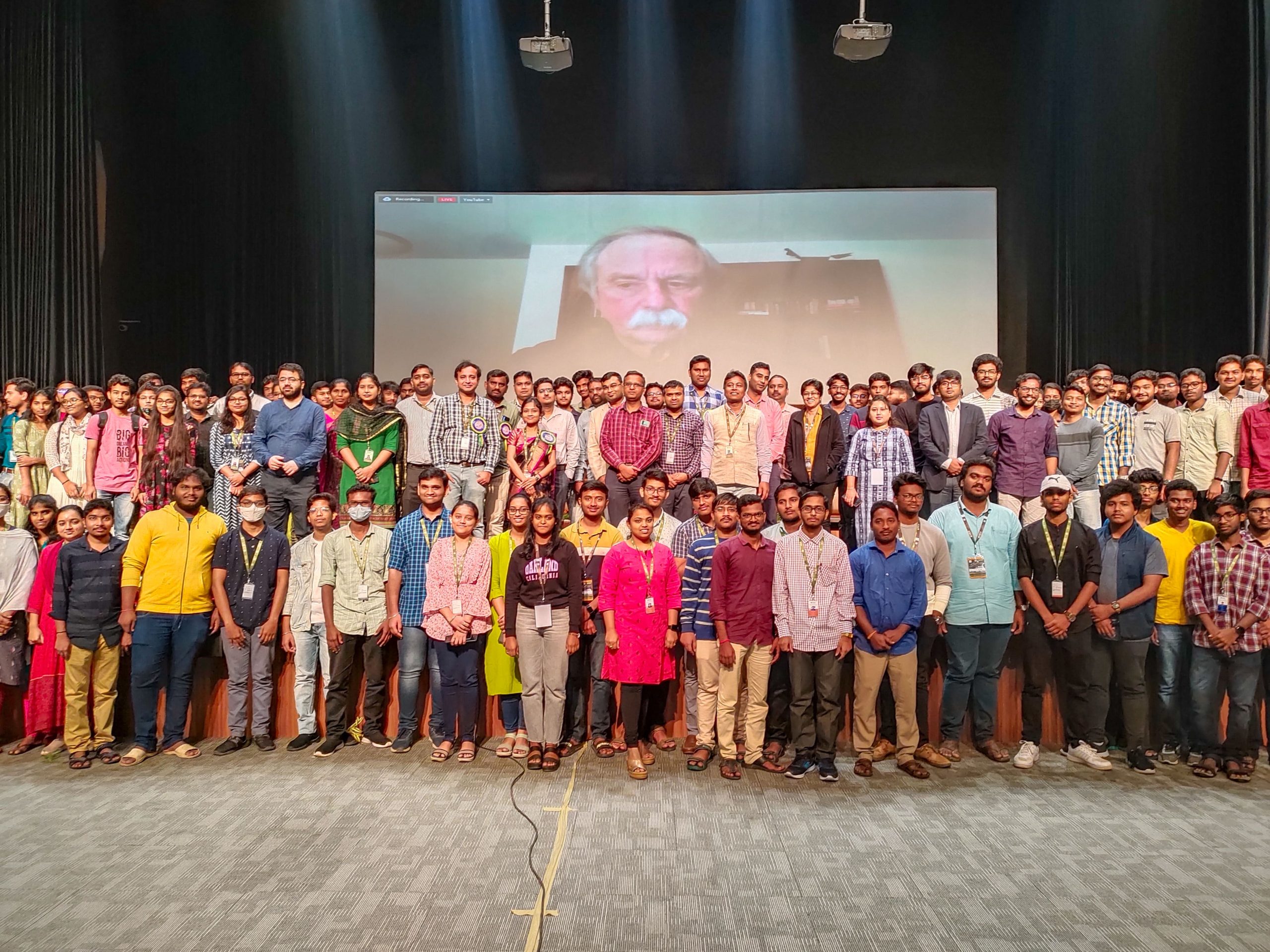 Nobel Laureate Prof. David Wineland, University of Oregon, USA, virtually joined the International Conference on Electronic and Photonic Integrated Circuits (EPIC- 2022) hosted by SRM University-AP from December 15 to 17, 2022. The American Physicist who was awarded the 2012 Nobel Prize in Physics for devising methods to study the quantum mechanical behaviour of individual ions delivered an insightful lecture on Atomic Clocks. The three-day-long conference organised by the Department of Electronics and Communication Engineering, SRM AP, concluded on Saturday, December 17, 2022; the Convenors of this event were Dr Pradyut Kumar Sanki and Dr Swagata Samanta.
Nobel Laureate Prof. David Wineland, University of Oregon, USA, virtually joined the International Conference on Electronic and Photonic Integrated Circuits (EPIC- 2022) hosted by SRM University-AP from December 15 to 17, 2022. The American Physicist who was awarded the 2012 Nobel Prize in Physics for devising methods to study the quantum mechanical behaviour of individual ions delivered an insightful lecture on Atomic Clocks. The three-day-long conference organised by the Department of Electronics and Communication Engineering, SRM AP, concluded on Saturday, December 17, 2022; the Convenors of this event were Dr Pradyut Kumar Sanki and Dr Swagata Samanta.
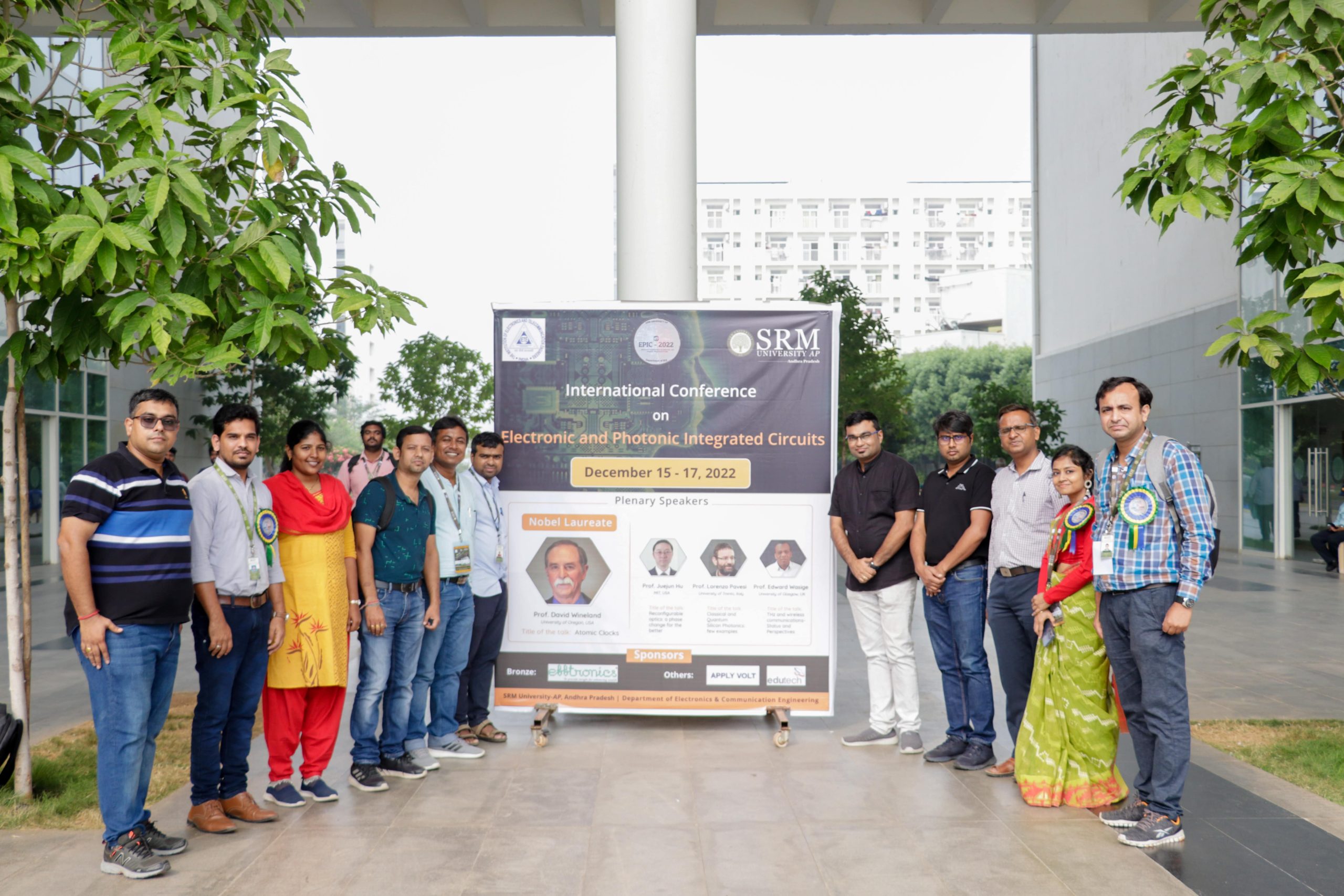 Nobel Laureate Prof. David Wineland elaborated on why the world needs precise clocks, the basics of how atomic clocks work, optical atomic clocks, the state of play and what the future might hold. Prof. Juejun Hu, Massachusetts Institute of Technology, USA; Prof. Edward Wasige, University of Glasgow, UK; and Prof. Lorenzo Pavesi, University of Trento, Italy were the Plenary speakers of this conference. Prof. Amlan Chakrabarti, Director, A. K. Choudhury School of Information Technology, University of Calcutta; Prof. Shankar Kumar Selvaraja, IISc Bangalore; Prof. Chetna Singhal, IIT Kharagpur; Prof. Naren Naik, IIT Kanpur; Prof. Samaresh Das, IIT Delhi; Prof. Shanti Bhattacharya, IIT Madras; Dr. Pranabendu Ganguly, IIT Kharagpur; Prof. Sarbani Ghosh, BITS Pilani; Dr. Bruno Romeiro, International Iberian Nanotechnology Laboratory, Portugal; Prof. Sakellaris Mailis, Skolkovo Institute of Science and Technology, Moscow, Russia; Prof. Shyamal Mondal, Defence Institute of Advanced Technology; Prof. Enakshi Bhattacharya, IIT Madras were the eminent speakers of the first two days. Prof. Achanta Venugopal, Director, NPL Delhi; Prof. T Srinivas, IISc Bangalore, and Prof. Ravindra Jha, IIT Guwahati, gave the keynote speeches on the last day of the programme. A session on ‘Women in Devices, Circuits & Systems’ was delivered by Prof. Sujata Pal, IIT Ropar; and Prof. Takako Hashimoto, Vice President of the Chiba University of Commerce (CUC), Japan; Industrial Talk by Dr Sajal Sarkar, Power Grid Corporation of India Ltd.; Dr. Pradipta Patra, Samsung Semiconductor India; Dr. Satyabrata Sarangi, Meta; Sunnyvale, California, USA; and Dr. Souvik Kundu, Intel Labs, USA, were the other highlights of the day.
Nobel Laureate Prof. David Wineland elaborated on why the world needs precise clocks, the basics of how atomic clocks work, optical atomic clocks, the state of play and what the future might hold. Prof. Juejun Hu, Massachusetts Institute of Technology, USA; Prof. Edward Wasige, University of Glasgow, UK; and Prof. Lorenzo Pavesi, University of Trento, Italy were the Plenary speakers of this conference. Prof. Amlan Chakrabarti, Director, A. K. Choudhury School of Information Technology, University of Calcutta; Prof. Shankar Kumar Selvaraja, IISc Bangalore; Prof. Chetna Singhal, IIT Kharagpur; Prof. Naren Naik, IIT Kanpur; Prof. Samaresh Das, IIT Delhi; Prof. Shanti Bhattacharya, IIT Madras; Dr. Pranabendu Ganguly, IIT Kharagpur; Prof. Sarbani Ghosh, BITS Pilani; Dr. Bruno Romeiro, International Iberian Nanotechnology Laboratory, Portugal; Prof. Sakellaris Mailis, Skolkovo Institute of Science and Technology, Moscow, Russia; Prof. Shyamal Mondal, Defence Institute of Advanced Technology; Prof. Enakshi Bhattacharya, IIT Madras were the eminent speakers of the first two days. Prof. Achanta Venugopal, Director, NPL Delhi; Prof. T Srinivas, IISc Bangalore, and Prof. Ravindra Jha, IIT Guwahati, gave the keynote speeches on the last day of the programme. A session on ‘Women in Devices, Circuits & Systems’ was delivered by Prof. Sujata Pal, IIT Ropar; and Prof. Takako Hashimoto, Vice President of the Chiba University of Commerce (CUC), Japan; Industrial Talk by Dr Sajal Sarkar, Power Grid Corporation of India Ltd.; Dr. Pradipta Patra, Samsung Semiconductor India; Dr. Satyabrata Sarangi, Meta; Sunnyvale, California, USA; and Dr. Souvik Kundu, Intel Labs, USA, were the other highlights of the day.
Additionally, a Panel Discussion was handled by Dr Rajkumar Elagiri, Apex Semiconductor; Dr Kamal Das, IBM Research Lab; and Dr Soumya Maity, Dell Technologies. Furthermore, the Young Researcher Forum conducted as part of the conference featured renowned academicians such as Dr Biswabandhu Jana, MIT and Harvard Hospital, USA; Dr Bibhas Manna, TU Wien, Germany; Dr Ankita Jain, Queens University, Canada; Dr Subhrajit Mukherjee, Technion – Israel Institute of Technology, Israel; Dr Rajat Subhra Karmakar, National Taiwan University, Taiwan; Dr Surajit Bose, Leibniz University Hannover, Germany; Dr Akanksha Pathak, Emory University, School of Medicine, USA; Dr Debidas Kundu, Carleton University, Canada; and Mayur Kumar Chhipa, ISBAT University, Kampala, Uganda, East Africa.
A pre-conference event: Smart SRM Hackathon – 24 Hrs Circuit Design Contest was organised on December 14, 2022. Poster & technical exhibition called Jigyasa took place on the first day of the conference EPIC-2022.
- Published in Conferences, Departmental News, ECE NEWS, News, Research Conferences
Recalibrating Curricula to Set Students Free for Exploring New Knowledge Arenas
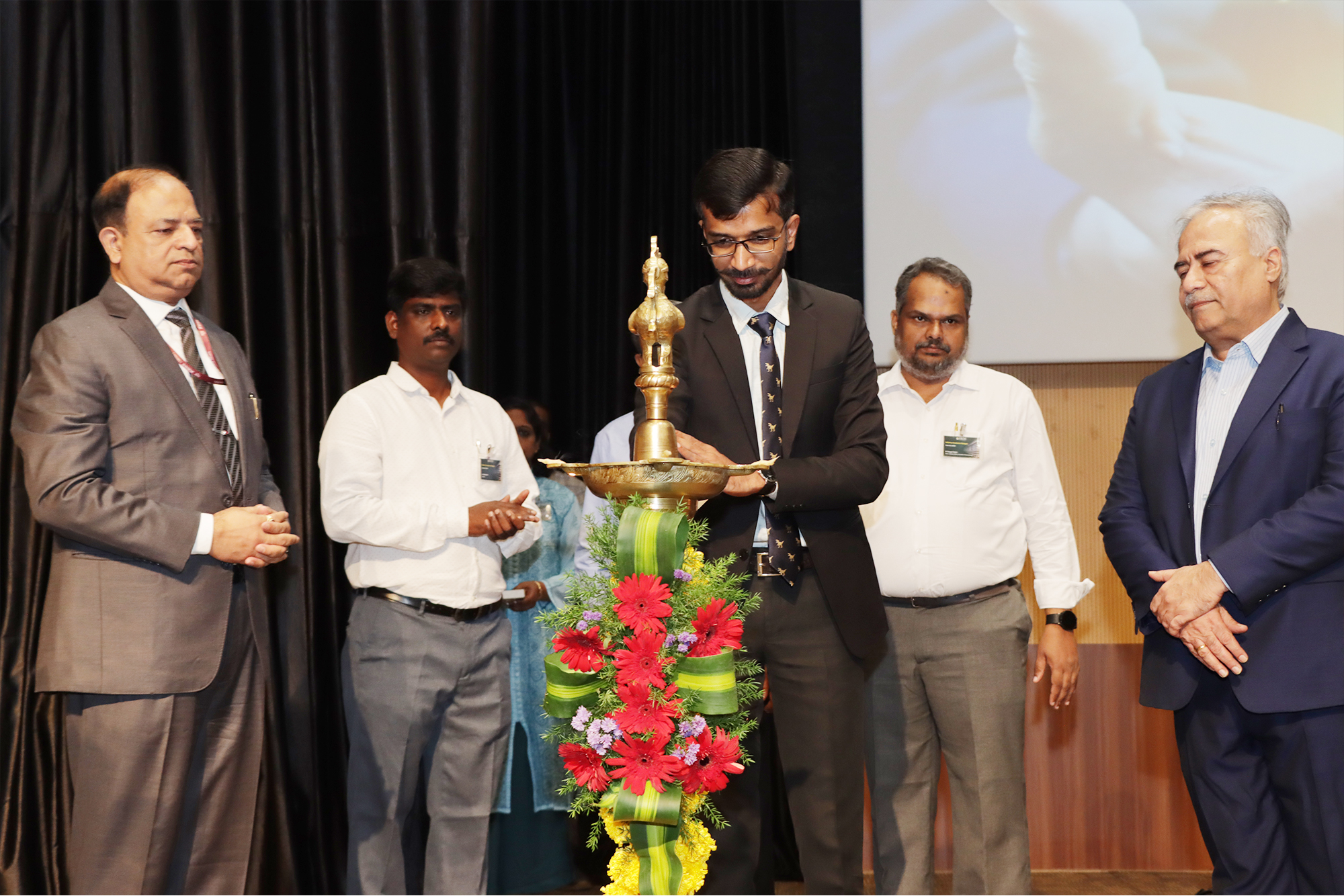 ‘‘You must give chances for students to explore new environments,’’ said Mr Dilip Gupta, MD of Sagarmala Development Company Ltd., while appreciating SRM University-AP for courageously taking the initiative to revamp the curricula to meet next-generation learning standards. He was one of the Guests of Honour at the Industry-Academia Dialogue held at the varsity with the objective of Revamping Curricula for Achieving Academic Excellence.
‘‘You must give chances for students to explore new environments,’’ said Mr Dilip Gupta, MD of Sagarmala Development Company Ltd., while appreciating SRM University-AP for courageously taking the initiative to revamp the curricula to meet next-generation learning standards. He was one of the Guests of Honour at the Industry-Academia Dialogue held at the varsity with the objective of Revamping Curricula for Achieving Academic Excellence.
The conclave considered the guidelines the National Education Policy (NEP) set forth and discussed the need to revamp the curricula to adapt the varsity’s educational programmes accordingly. Mr Gupta elaborated on why the curriculum of educational institutions should be crafted with windows for students to explore themselves and newer arenas of knowledge. He implored the Vice Chancellor and the varsity faculty to pose a new challenge for the students every day.
Mr V Vinod Kumar, IAS, MD, Andhra Pradesh Skill Development Corporation (APSDC), was the other Guest of Honour at the event. He lauded the impact of a well-crafted and executed curriculum in escalating the employment rate of society while generating skilled professionals. ‘‘You need to impart skill to students while they are at the educational set-up. Polish them inside the educational institution. It is a herculean task, but I’m sure we are on the right path,’’ added Mr Vinod.
Honourable Vice Chancellor Prof. Manoj K Arora lightened the lamp with the Guests of Honour and began the conclave. Prof. Arora presented the university-level curriculum framework in front of the esteemed delegates and the university faculty, while deans of the three varsity schools presented the school’s overviews, achievements, and aspirations. Dr R Premkumar, Registrar and Dr Vinayak Kalluri, Dean-Academic Affairs and Controller of Examination, graced the occasion with their valuable presence. More than 50 professionals from the industry and leading practitioners from the social sector participated in the dialogue to address the foreseen challenges in higher education and recalibrate the curriculum of the varsity.
Through multiple sessions, the all-day-long dialogue considered the imperative to cultivate and enhance high levels of technological and social skills within the digital era’s present and future workforce. A joint panel discussion on 21st-century skills and Interdisciplinary learning with representatives from Academia and Industries; and a brainstorming session on exploring ways for continuous industry engagement with academia were also held as part of the conclave. The distinguished delegates visited the research centres and facilities at SRM University-AP once the event was over.
- Published in Conferences, News


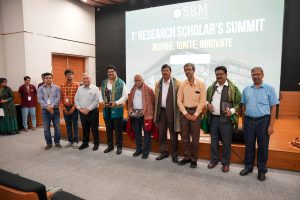
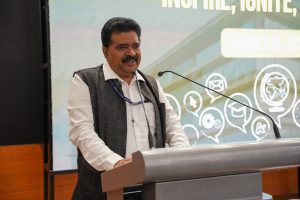
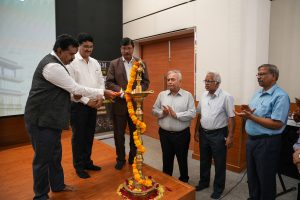
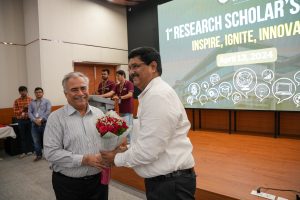
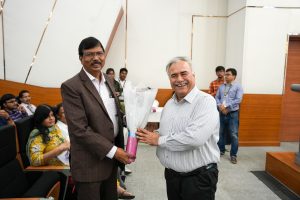
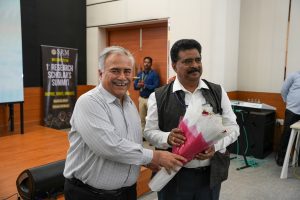
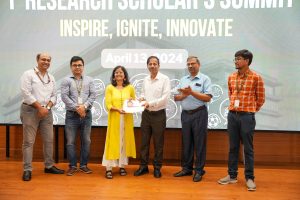
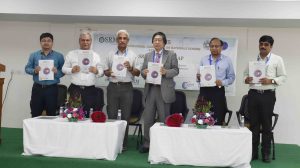 Abstract Book launch by dignitaries.
Abstract Book launch by dignitaries.